Fuentes-Packnick focuses on cultural and racial competence during Penn State journey

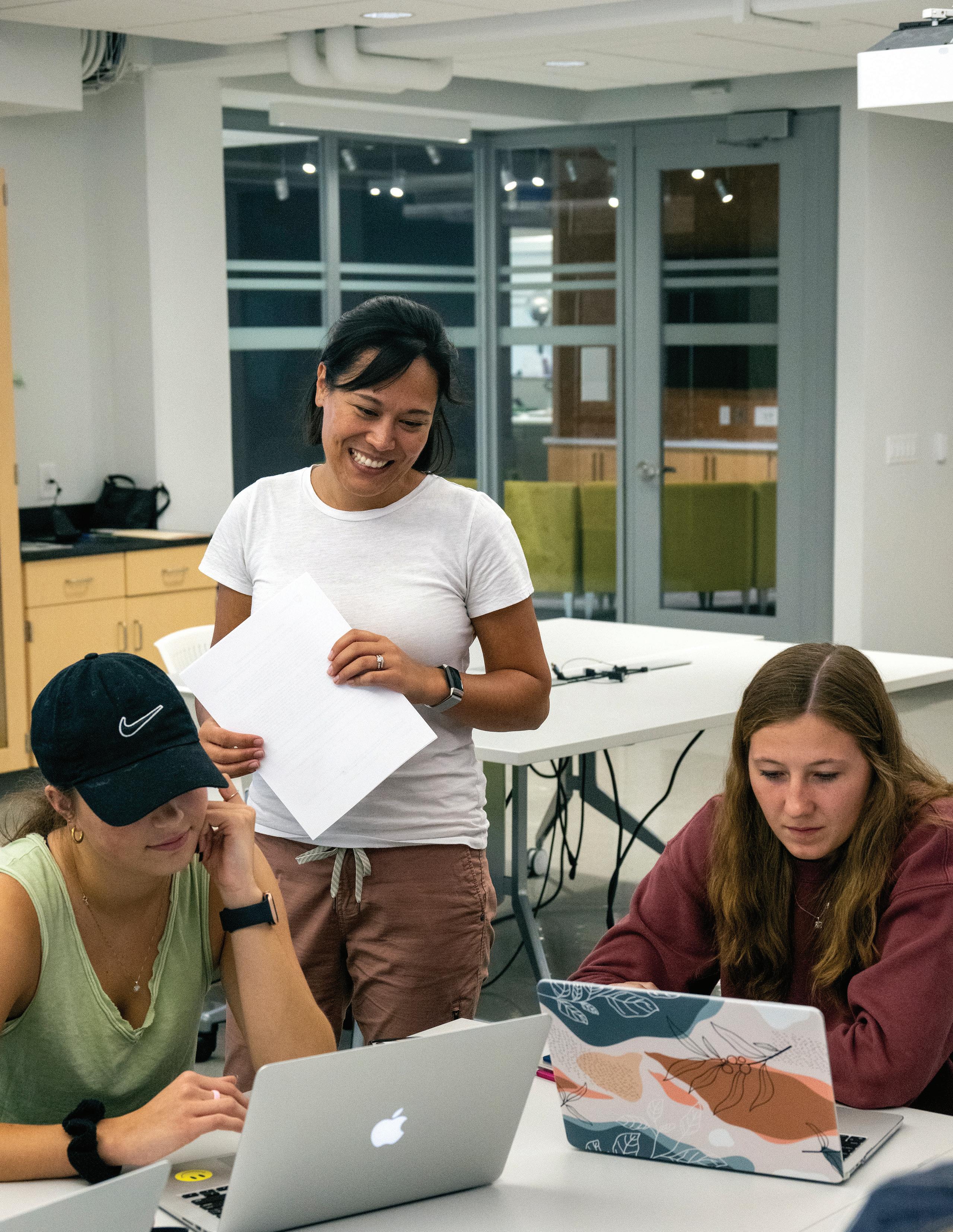
Fall Two Thousand Twenty-two
Dean Kimberly A. Lawless
Editor
Annemarie Mountz Writers
Jonathan Altland, Brian Cox, Stephanie Koons, Annemarie Mountz Photographers
Brian Cox, Stephanie Koons, Annemarie Mountz, Peter Terpstra
Contact Us
247 Chambers Building University Park, PA 16802-3206 814-863-2216
ed.psu.edu/ • edrelations@psu.edu
Published twice a year by the Penn State College of Education
College of Education Alumni Society Officers
President: Jonathan Klingeman
President-elect: Catherine Tomon
Immediate past president: Joe Clapper Secretary: Sherry Yontosh
Directors
Nicole Birkbeck
Tonya DeVecchis-Kerr
Kiley Foley Pamela Francis Caleb Gildea
Krishawna Goins
Ramon Guzman, Jr. Sarah Lozano
Deborah Marron Amy Meisinger John Rozzo Sharon Salter Sharlene Yontosh William Clark Ronald Musoleno Matt Richards
APG Representatives
The University is committed to equal access to programs, facilities, admission and employment for all persons. It is the policy of the University to maintain an environment free of harassment and free of discrimination against any person because of age, race, color, ancestry, national origin, religion, creed, service in the uniformed services (as defined in state and federal law), veteran status, sex, sexual orientation, marital or family status, pregnancy, pregnancy-related conditions, physical or mental disability, gender, perceived gender, gender identity, genetic information or political ideas. Discriminatory conduct and harassment, as well as sexual misconduct and relationship violence, violates the dignity of individuals, impedes the realization of the University’s educational mission, and will not be tolerated. Direct all inquiries regarding the nondiscrimination policy to the Affirmative Action Office, The Pennsylvania State University, 328 Boucke Building, University Park, PA 16802-5901, Email: aao@psu.edu, Tel (814) 863-0471. This publication is available in alternative media on request. U.Ed EDU 23-47
Jhan Doughty Cass Ramsey
Contents
1 Dean
provides a brief update News & Notes 2 College of Education welcomes 13 new faculty members for fall semester Features 4 Fuentes-Packnick focuses on cultural, racial competence during Penn State journey 8 Reed-Porter among the less than 2% of Black male K-12 teachers nationwide 10 Educational Leadership program helps grow teacher capacity 12 Rehabilitation and Human Services program fights disability stigma Research 14 Families learn about science in their community with augmented reality 15 Researchers develop framework for doctoral program assessment 16 Emergent bilinguals lost vital instruction during remote learning, study shows 17 Research news in brief Impact 18 Carla Zembal-Saul helping schools implement new science education standards 19 Giving Tuesday Campaign to support Office of Education and Social Equity Alumni 20 Alumni Fellow Pewewardy returns to campus Development 21 Message from the Dean’s Development Council Chair; Nominate outstanding alumni for excellence awards
Dean’s Message
Kimberly A. Lawless
On the cover: Kaela Fuentes-Packnick teaches a First-Year Seminar class in the Penn State College of Education Photo: Annemarie Mountz Student Members Michael Cattell Brandin Conrath Rory Murphy
Dean’s Message

Pushing boundaries. It’s what we do here in the Penn State College of Education. Every day, in every way, our students, faculty and staff are finding ways to do what they do … better. We as a community have thrown out the status quo, because the status quo does not address the inequities found in education or in our everyday lives.
By pushing boundaries in research, we are finding new ways to teach, so everyone has the opportunity to learn. One example of this is the work being done by Heather Toomey Zimmerman, who is leading a research project exploring the use of augmented reality to enhance learning about local science for rural families. Another example is research being done by a team including Peggy Van Meter that is leading to the development of a framework for the assessment of doctoral students in the natural sciences. You can read about both of these research projects in this issue of the magazine.
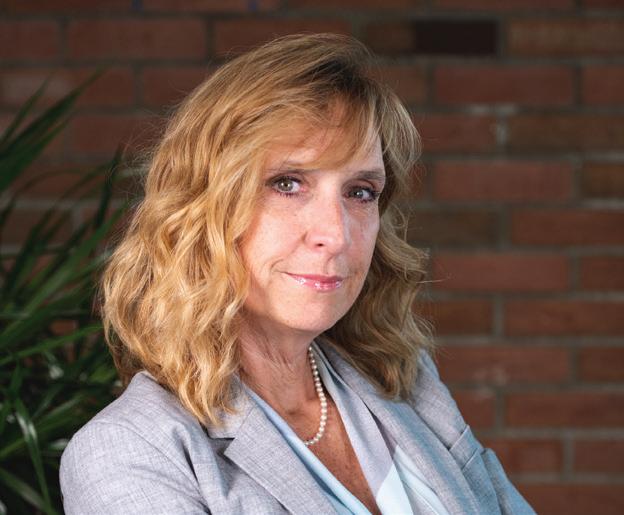
While meaningful work is being done throughout our college, if I had to choose one person who embodies the spirit of “pushing boundaries” and “changing education by educating for change,” it would have to be the subject of our cover story, Kaela Fuentes-Packnick. Kaela first came to the College of Education as a high school student enrolled in our Summer College Opportunity Program in Education (S.C.O.P.E.) in 2004. She went on to get her bachelor’s, master’s and doctoral degrees from our college, and now is a postdoctoral scholar with us. Throughout her career with us, Dr. Packnick has pushed the boundaries of what was possible. As a postdoctoral scholar in anti-racist pedagogy, she is again pushing boundaries and challenging the conventional model of a postdoc by incorporating a practitioner focus into what historically has been a research-focused position. In keeping with the college strategic plan, she is working to bring more inclusive practices into all of the college’s courses. You can read her truly inspiring story starting on page 4.
Our college has a lot of inspiring alumni, but I want to highlight one in particular: Cornel Pewewardy, who was just named an Alumni Fellow. This is the highest honor bestowed by the Penn State Alumni Association. Dr. Pewewardy was on campus at the end of September to receive his award, and he spent some time with us in the college. Earning his D.Ed. in educational administration in 1989, Dr. Pewewardy has dedicated his life’s work to bringing together the power of Indigenous education with the power of higher education. Learn more about him on page 20.
Finally, I want to call to your attention the article about Giving Tuesday on page 19. To advance our mission of “changing education by educating for change,” the College of Education once again will raise financial support for the Office of Education and Social Equity (OESE). The Office of Education and Social Equity works to foster equity and inclusion by creating educational opportunities and experiences, raising awareness and developing strategies and tools to enhance intercultural, racial/ethnic competence. For many students, it is their home away from home, their community, their “safe space.” The staff is passionate about fostering this welcoming environment, as well as working to increase access to post-secondary opportunities, and infusing equity and inclusion across the curriculum and student experiences. Please visit https://raise.psu.edu/givingtuesdayedu to learn more about supporting OESE on Giving Tuesday.
I encourage you to continue to follow what’s happening in our college through Bridges, our e-newsletter. If you don’t receive that twice-monthly email newsletter and would like to, please email edrelations@psu.edu and ask to be added to the subscription list.
1Penn State Education
Dean Kimberly A. Lawless
College of Education welcomes 13 new faculty members for fall semester
By Brian Cox
There are several new members of the Penn State College of Education faculty as 13 new hires have been brought aboard for the fall semester.
“This latest cohort of 13 tenure-line faculty adds to our existing complement of outstanding faculty as we strive to achieve our strategic mission to change education by educating for change,” said Kim Lawless, dean of the College of Education.
Lawless cited the varying perspectives and experiences that shape each educator as huge assets for the college as it strives toward that goal. The dean also said the potential for what this new group of faculty can do provides a level of excitement about the academic year.
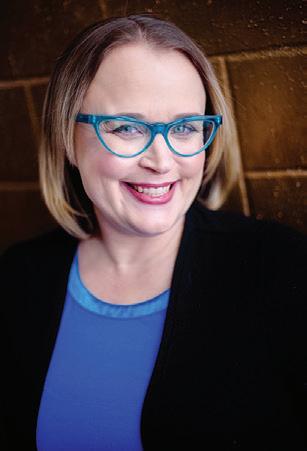
“What is unique about this group of hires is that they each bring a criticality to their work that challenges the assumptions of our past and creates new possibilities for our future,” Lawless said. “I cannot wait to see what we will accomplish together in the year to come.”
The new College of Education faculty:
• Angelique Aitken, assistant professor of education, comes to the college from the University of Tennessee, Knoxville, where she was an assistant research professor. Aitken’s research surrounds literacy interventions for developing readers and writers with high-incidence disabilities and the teachers who support them. To date, her research has centered on literacy instruction, literacy motivation and special education. Read more at https://bit.ly/Education_Aitken
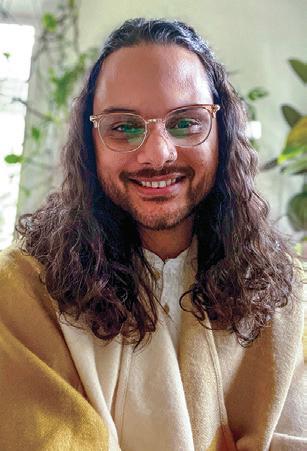
• Sophia Ángeles, assistant professor of education (bilingual), earned a doctorate in education with a concentration in urban schooling at the University of California, Los Angeles’ School of Education and Information Studies. Ángeles’ research examines how immigration and language policies and practices shape
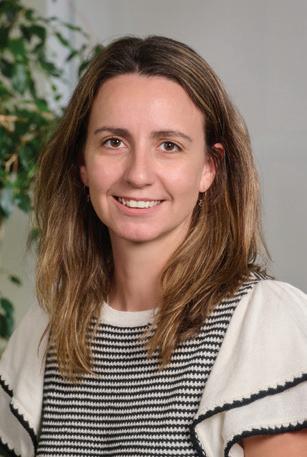
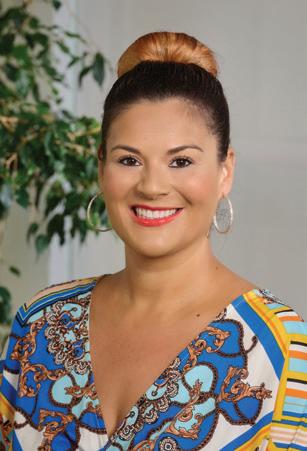
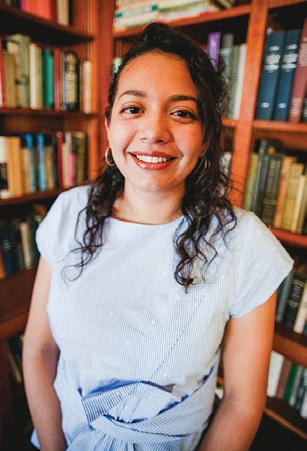
the educational trajectories of high school-age immigrants. She also has worked to protect the rights of English learners and their families while accessing an equitable education through the Californians Together English Learner Leadership & Legacy Initiative. Read more at https://bit.ly/ Education_Angeles
• Brittany Aronson joins the college as associate professor of education (teacher education) from Miami University in Ohio, where she served as an assistant professor in educational leadership. Her research work has been rooted in discovering where inequality exists within the education system and how to best create lasting and meaningful change. Read more at https://bit.ly/Education_Aronson
• Javier Casado Pérez returns to Penn State as assistant professor of counselor education five years after earning a doctorate from the College of Education and later taking a job as program coordinator of Marriage, Couples and Family Counseling at Portland State University. They focus their scholarship on mental health justice, equity-minded instructional design, critically conscious trauma-informed care and the institutional experience of racially minoritized educators. Read more at https://bit.ly/Education_Casado-Perez
• Jimena Cosso joins the college as assistant professor of education (critical quantitative) after having completed her doctorate at Purdue University. Cosso’s research focuses on exploring the home environment of Latine families and its association with dual language learners’ (DLL) early skills, with a focused look at early mathematics skills. Her work addresses Latine families’ funds of knowledge to support the development of school readiness skills and contextual factors that affect DLL children’s skills readiness. Read more at https://bit.ly/ Education_Cosso
2 Penn State Education News & Notes
• Mariah Harmon joins the college as assistant professor of education (teacher education) after completing her doctorate at Vanderbilt University’s Peabody College. Her research interests are teacher learning and understanding how teachers build inclusive and equitable classrooms, and on the developmental needs of Black women pre-service teachers. Read more at https://bit.ly/Education_ Harmon
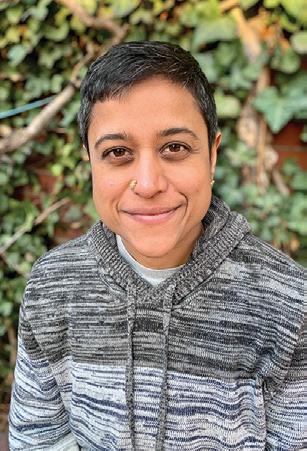

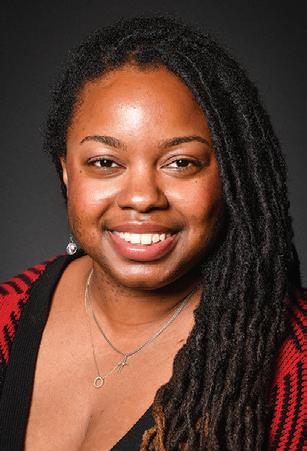
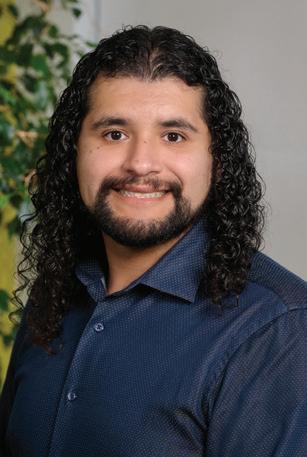
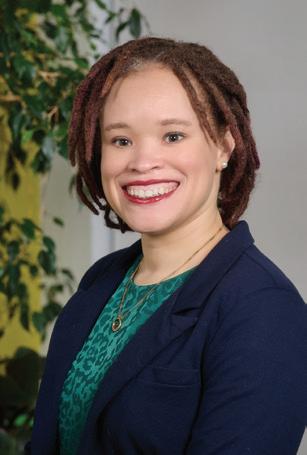

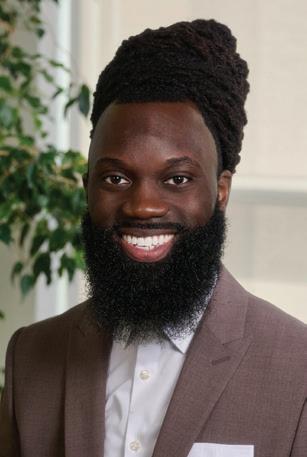
• Rishi Krishnamoorthy, assistant professor of education (science education), comes to Penn State from Rutgers University where they served as a postdoctoral associate in the Department of Teaching and Learning. Krishnamoorthy completed their doctorate in science education at New York University. Their research takes a sociocultural and material approach to investigate meaningmaking and learning, both in and out of school settings. Read more at https://bit.ly/Education_ Krishnamoorthy
• Aiesha Lee joins Penn State’s College of Education as assistant professor of education (counselor education) in the Department of Educational Psychology, Counseling, and Special Education. Lee, a licensed professional counselor in New Jersey and a nationally certified counselor, has research interests in Black families, intergenerational trauma, spirituality and trauma-informed care. Her clinical experiences include working with children, families and adults in a community clinic. Read more at https://bit.ly/Education_Lee
• Ricardo Martinez has joined the Penn State College of Education as assistant professor of education (mathematics education) from the University of Nebraska-Lincoln, where he was an assistant professor of teaching, learning and teacher education. His research seeks to discover and dismantle root causes that lead people to believe that they are not “math people” by investigating how mathematics can be used to empower students and teachers. Read more at https://bit.ly/Education_Martinez
• Lydia Ocasio-Stoutenburg is assistant professor of education (special education with a focus on early intervention) in the Department of Educational Psychology, Counseling, and Special Education. She comes to Penn State from the University of Miami. Her research has a specific focus on intellectual and developmental disability (IDD), transition supports and early intervention/early childhood. Read more at https://bit.ly/Education_Ocasio-Stoutenburg

• Wilson Okello joins the Penn State College of Education as assistant professor of education (higher education) in the Department of Education Policy Studies. He joins Penn State from the University of North Carolina Wilmington. Okello, who earned his doctorate from Miami University in Ohio, draws on Black critical theories to advance research on student development theory, critical qualitative inquiry and anti-racist curriculum and pedagogies, among others. Read more at https://bit.ly/Education_ Okello
• Kamaria Porter joins Penn State’s College of Education as assistant professor of education (higher education) in the Department of Education Policy Studies with a wide array of experience in the field of racial and gender equities in higher education, particularly in graduate education and campus sexual assault. During her doctoral program at the University of Michigan, Porter was a researcher on the University Responses to Sexual Assault Research project through the Department of Sociology. Read more at https://bit. ly/Education_Porter
• Wenting (Ellen) Zou joins the College of Education faculty as assistant professor of education (educational psychology) in the Department of Educational Psychology, Counseling, and Special Education. She is co-hired by Penn State’s Institute for Computational and Data Sciences (ICDS). Her research lies at the intersection of learning sciences, learning analytics and instructional design with artificial intelligence (AI). Read more at https://bit.ly/Education_Zou
3Penn State Education News & Notes
Fuentes-Packnick focuses on cultural, racial competence during Penn State journey
By Stephanie Koons
Inthe 1940s, the author Thomas Wolfe wrote the famous adage, “You can’t go home again.” Kaela FuentesPacknick, a postdoctoral scholar in anti-racist and inclusive pedagogy in the Penn State College of Education, has proven that saying wrong over and over. Throughout her trajectory at Penn State, which started in high school, she has developed a vision for racial equity and inclusion that she hopes to instill in the next generation of educators.
“I’ve seen the college from so many angles over my many years here,” said Fuentes-Packnick, who received her doctorate from the College of Education in May 2022 and started her postdoctoral position in fall 2022. “I feel like I have a unique perspective having been a high school student, undergraduate and graduate student and a deep well of motivation to help it continue to grow and work toward becoming an anti-racist program.”
Fuentes-Packnick, a native of Easton, Pennsylvania, got her first taste of Nittany Lion pride when, at age 16, she participated in the Summer College Opportunity Program in Education (S.C.O.P.E), a program under the College of Education that provides current high school sophomores from diverse backgrounds an opportunity to experience college course work and learn about careers in the education field.
“I came to campus, lived on campus for five weeks, fell in love with the College of Education — that was it for me,” said FuentesPacknick. “Every (other) school that I looked at, (Penn State) was just the bar for which I measured all other schools.”
For Fuentes-Packnick, who identifies as biracial AsianAmerican (her father is Filipino and her mother is white), the S.C.O.P.E. program was an eye-opener in the sense that it was the first time she “saw so many people who looked like me pursuing degrees in education and it was the first time I learned what you could do with a Ph.D. Up until that point, the only people I knew who had Ph.D.s in education were school principals and superintendents and honestly, overwhelmingly, white men.”
Left:
When it came time to choose a university, there was little doubt in Fuentes-Packnick’s mind about where she belonged. Her S.C.O.P.E. experience had instilled in her a sense of community and belonging, which she said was particularly important for her as a person of color.
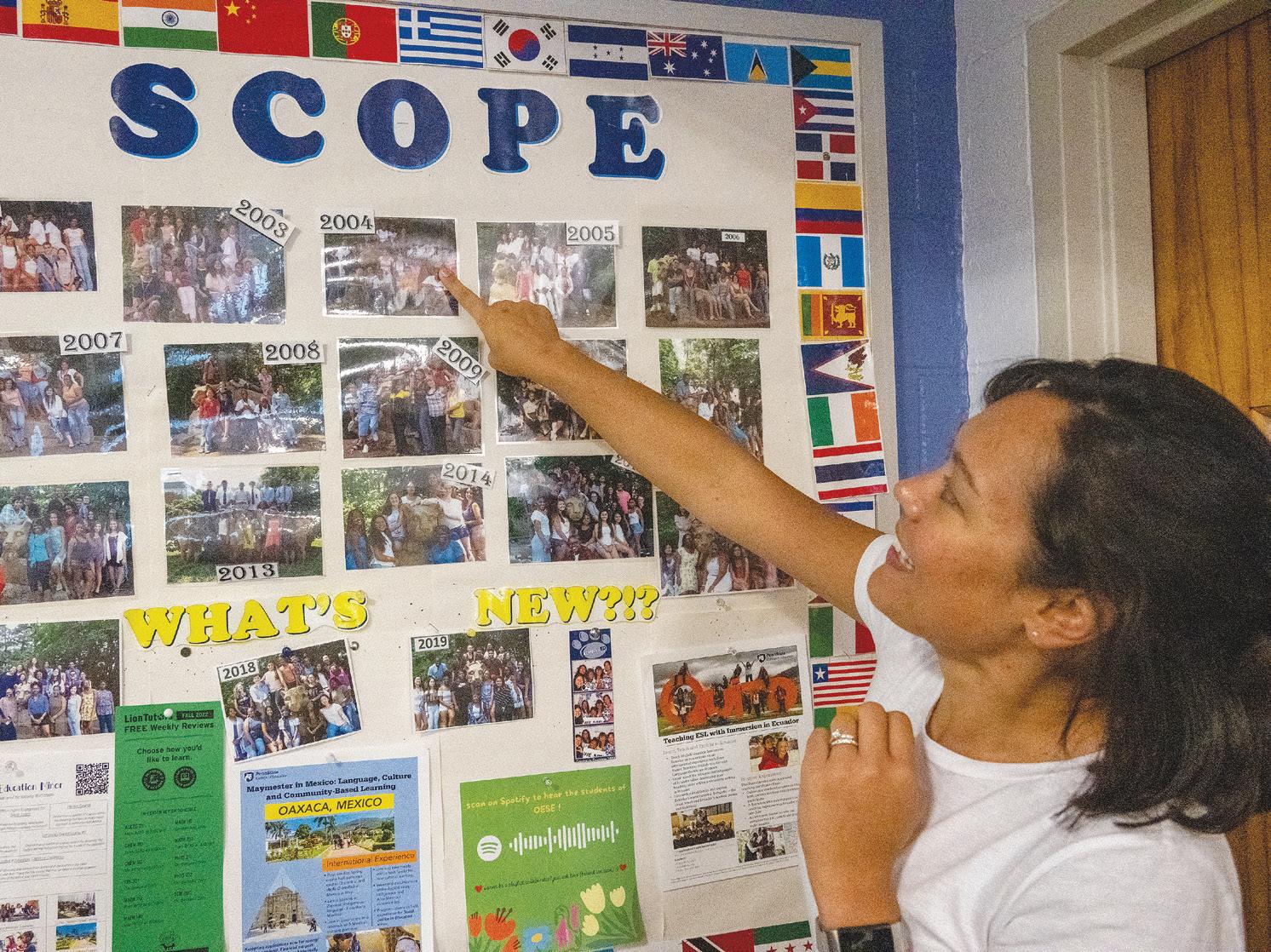
“I think that was the beauty of doing S.C.O.P.E., a lot of my S.C.O.P.E. siblings ended up coming to Penn State and the College of Education. I was coming into this
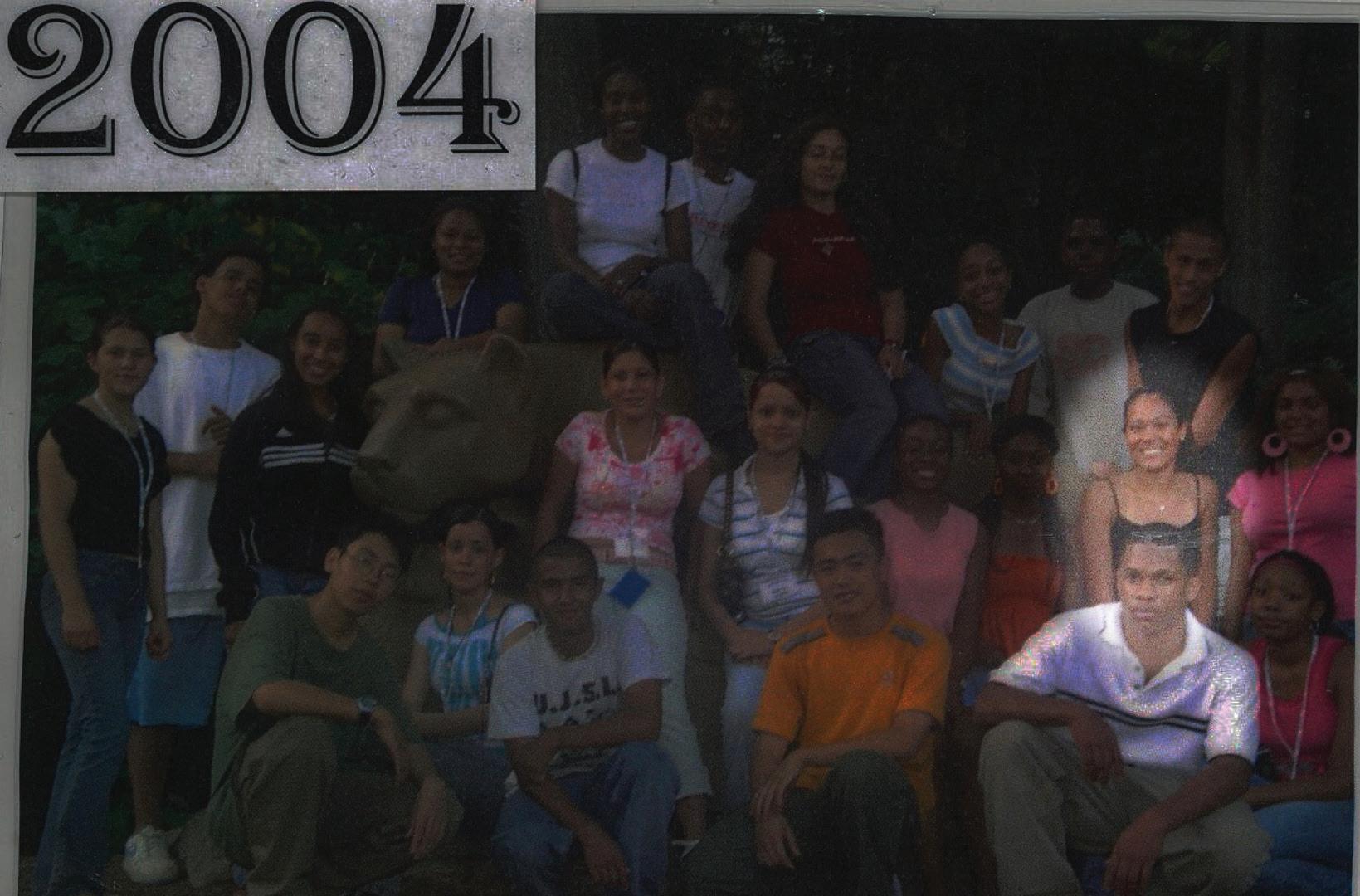
4 Penn State Education Features
Photo: Annemarie Mountz
Above: Penn State College of Education alumna Kaela FuentesPacknick points to herself in a photo of students involved in the Summer College Opportunity Program in Education (S.C.O.P.E.) in 2004.
Fuentes-Packnick is spotlighted in the photo at which she is pointing in the above photo. (photo provided)
family that already existed for me. Penn State is a predominantly white institution and that can be really, really overwhelming for students of color to find a space where they feel they belong and they feel they’re supported. For me, I knew I would be able to find that.”
Fuentes-Packnick found additional support by getting involved with the Office of Education and Social Equity (OESE), which works to foster equity and inclusion by creating educational opportunities and experiences, raising awareness and developing strategies and tools to enhance intercultural, racial/ethnic competence.
Upon arriving at Penn State, Fuentes-Packnick knew where she wanted to focus her studies. She decided to major in special education and was in the first cohort in the Special Education and Curriculum Instruction with Emphasis in Language and Literacy Education Integrated Undergraduate-Graduate (SE/CILLED IUG) Degree. The program consists of integration of required courses for a B.S. in Special Education with courses required for certification as a reading specialist and a M.Ed. in Curriculum and Instruction with emphasis in Language and Literacy Education (LLED).
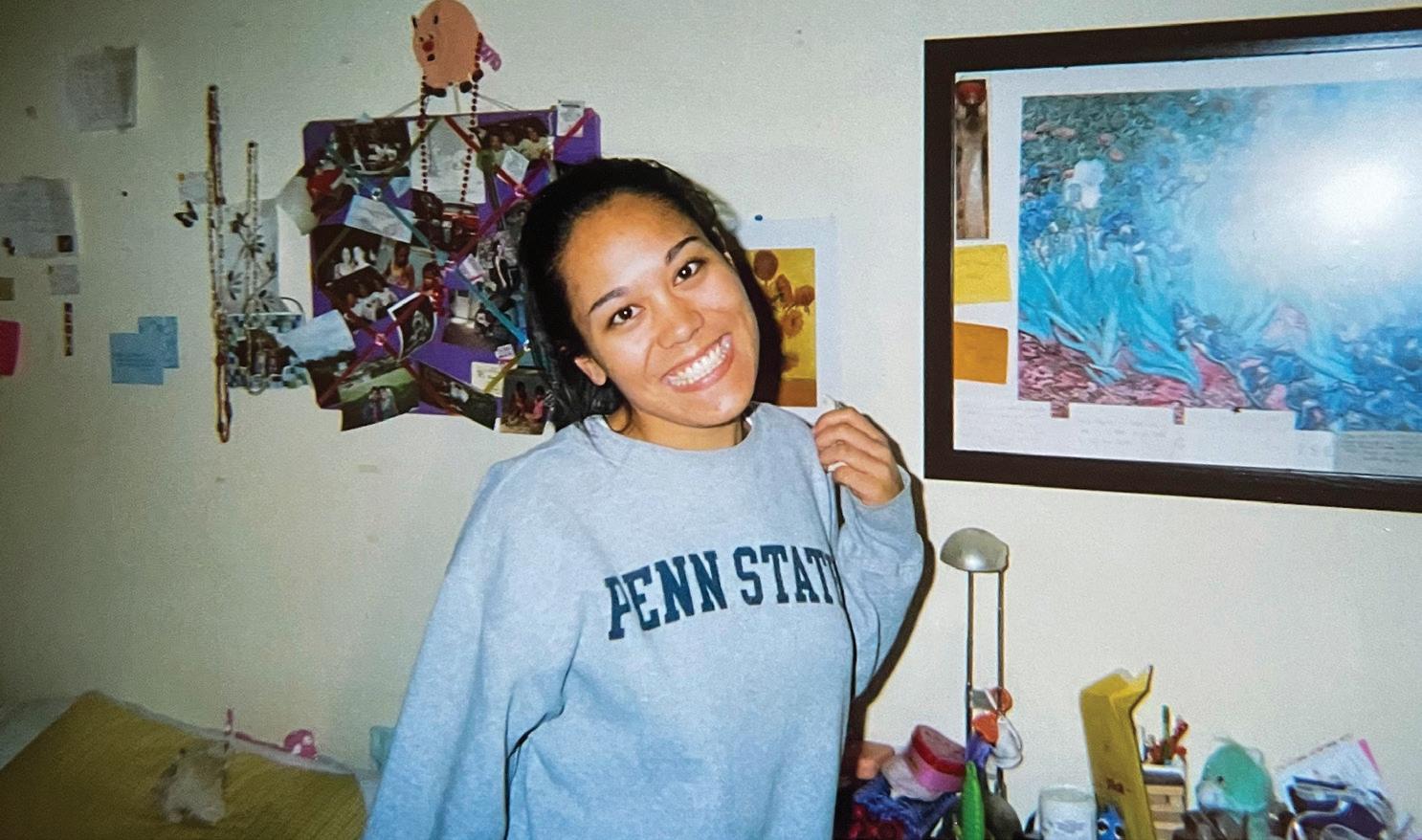
Like many individuals who choose to go into special education, Fuentes-Packnick found her calling through personal family experiences. As the oldest of three children, she has a younger sister, Ariel Steffy, an alumna of Penn State Berks, and a younger brother, Nick. At some point during their childhood, the family recognized that Nick was encountering difficulties at school due to undiagnosed cognitive disabilities. He was eventually diagnosed with attention deficit hyperactivity disorder (ADHD) and auditory processing disorder, Fuentes-Packnick said, but “it was a fight to get him identified — the school did not believe he was
struggling enough.”
One of the reasons that Asian American students with disabilities struggle to be heard, FuentesPacknick said, is their reputation as a “model minority” — a term that has often been used to refer to a minority group perceived as particularly successful. In addition, parents may perceive stigma attached to their children being identified as having a disability. Fuentes-Packnick said that she sees that cultural vacuum as an opportunity to identify and address the expectations and norms within school systems that aren’t culturally responsive.
“Seeing differences between the public school system and what a private school for students with learning disabilities was able to offer (Nick) made me recognize limitations of the public school system. But it made me wonder, are there ways I can change the structure and expectations within my own classroom to ensure more of my students are successful?”
While enrolled as an undergraduate student at Penn State, Fuentes-Packnick had the opportunity to support a few professors with their research. Not only was she able to get a glimpse into how research is conducted behind the scenes, but also she started to integrate research into
her personal vision of how she could make a difference as an educator.
“I could see how personal educational research could be,” she said. “All the projects were really important to professors, and it made me excited about the prospect of doing things I’m passionate about, problems I’ve experienced myself.”
After graduating from Penn State with her bachelor’s and master’s degrees in 2011, Fuentes-Packnick took a position as a teacher at Grove School, a therapeutic boarding school in Madison, Connecticut. She said she related to the school’s philosophy of putting academics — rather than solely therapeutics — at the forefront.
“In looking back at it, a lot of my master’s paper centered on the importance of building relationships with students and families, that those positive relationships can help create a more supportive learning environment,” she said. “Those values I learned during my master’s program really influenced my decision to take a job at Grove because that was something that they prioritized at the school. The teamwork between teachers, students, administrators, therapists and families was something that I wanted to be a part of.”
Fuentes-Packnick’s experience teaching in Connecticut was more
5Penn State Education
Features
Photo provided
Kaela Fuentes-Packnick as a first-year student at Penn State in the fall of 2006.
than just a time of professional growth — she met her now-husband, Steve, who also was a teacher at the school. They married in 2016, a month into starting her doctoral program at Penn State. Steve Packnick is currently Department Chair of History & Social Studies at Grier School, a boarding and day school for girls in grades seven through 12, located in Birmingham, Pennsylvania.
After teaching at Grove School for five years, Fuentes-Packnick decided she wanted to delve deeper into the educational research she was first exposed to as an undergraduate. While teaching, she had noticed how often her middle schoolers did not identify themselves as readers.
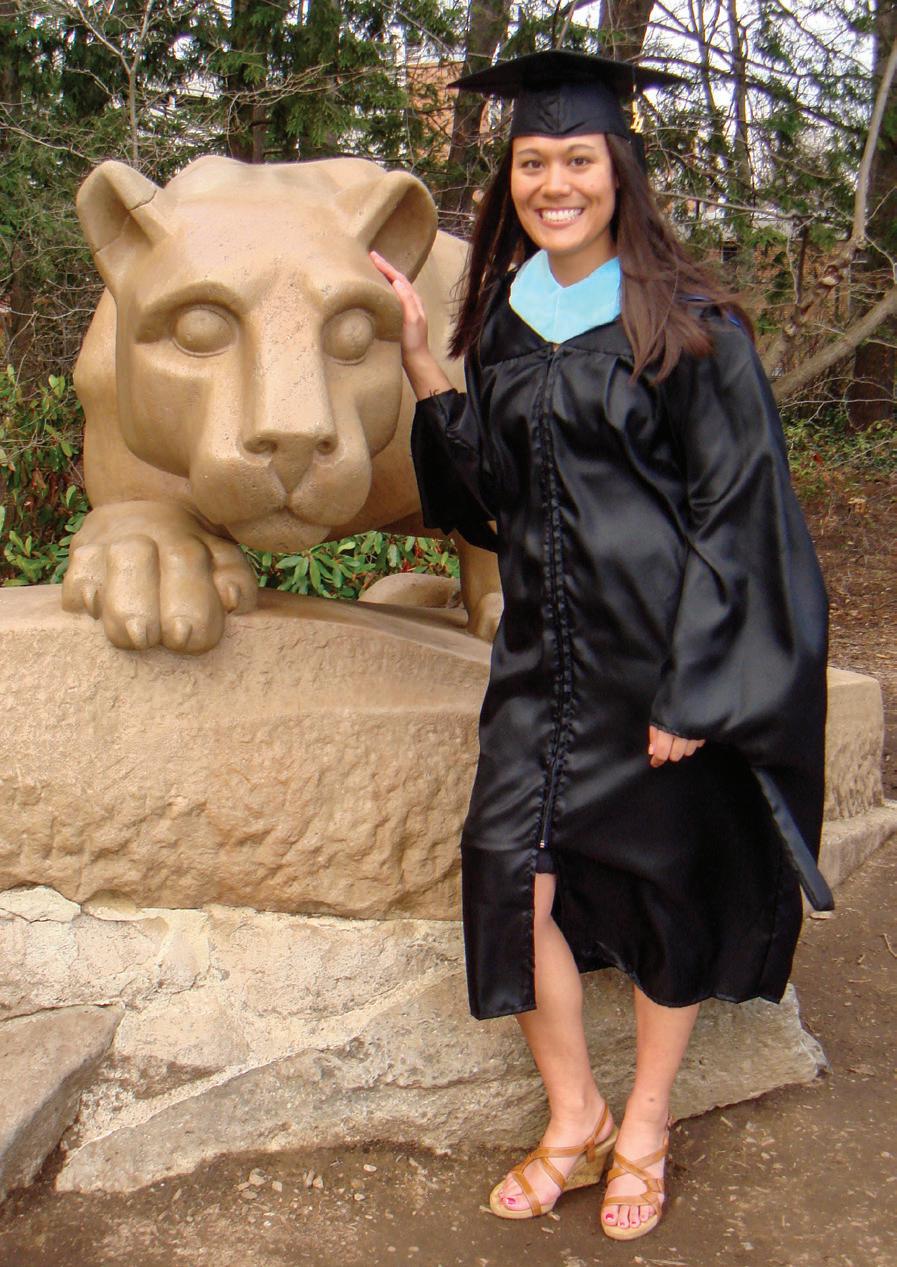
“So when I was thinking about the research I hoped to do in a doctoral program, I already knew that the faculty here in the college were doing phenomenal work in areas I was interested in,” she said.

She enrolled in the doctoral program in language, culture and society in the Department of Curriculum and Instruction in 2016 and upon returning to University Park, revisited the idea of academic research being personal and passionate versus purely analytical.
Toward the end of Fuentes-Packnick’s second year in her doctoral program, she took the dis/ ability critical race studies course taught by Kathleen Collins, associate professor of education (literacies and English language) that “completely changed the trajectory of my work.”
“She exposed me to an entire field of study that was working
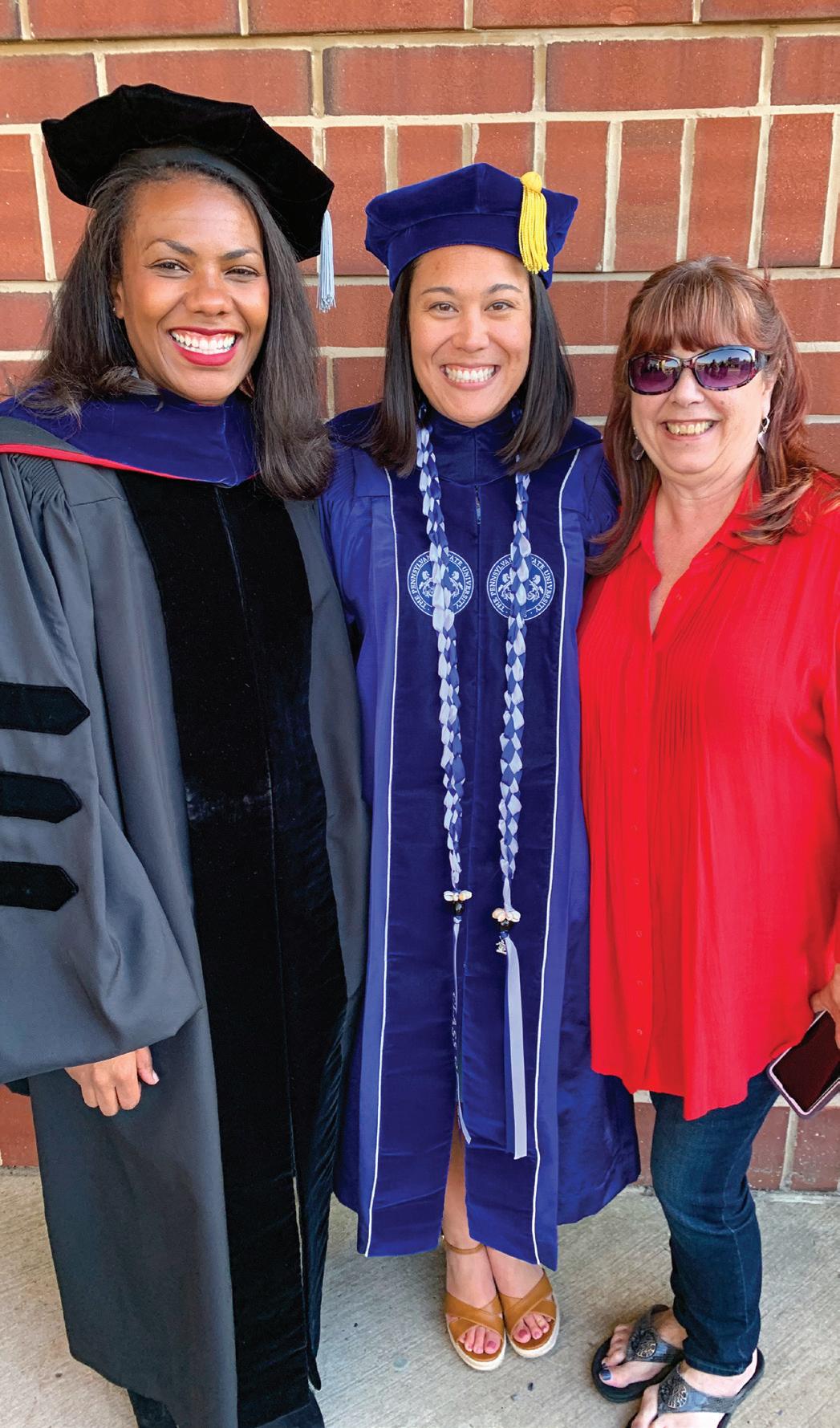
6 Penn State Education Features
Photos provided
Above: Kaela Fuentes-Packnick poses for a photo at the Nittany Lion Shrine after completing her undergraduate studes in the Penn State College of Education in 2010.
Left: Fuentes-Packnick, center, poses with Associate Professor of Education Ashley Patterson, left, and Assistant Dean for Education and Social Equity María Schmidt, right, at her doctoral commencement ceremony at Penn State this past May.
Below: Fuentes-Packnick at the Nittany Lion Shrine after earning her master’s degree in 2011.
to answer so many questions that I had about race, ethnicity and disability in education and aligned with the ways that I view and think about education. Dr. Collins and my adviser, Dr. Ashley Patterson, helped me see ways that I could connect my personal and family experiences with things that I saw in my own classroom and help contribute to a growing field that was also asking questions about how Asian American students with disabilities may be experiencing schooling.”
The title of Fuentes-Packcnick’s dissertation was “Breaking the Model Minority Mold: Storying the Experiences of Asian Americans Labeled Dis/abled.”
“Through my dissertation research, I aimed to bring attention and volume to the stories and experiences of Asian Americans who have struggled within school settings in the hopes of challenging common narratives about Asian American students and presenting essential perspectives to educators,” she said.
The participants in FuentesPacknick’s study were mostly adults in their 20s reflecting on a lifetime of experiences in the educational system.
“I found that across all the participants when reflecting on their schooling experiences, positive or negative, their various social identities came into play,” she said. “When they were surrounded by educators that had made efforts to build positive relationships and
work to honor and celebrate their identities, particularly their ethnic identity and educational needs, participants recalled feelings of safety, security and increased self-efficacy. I think that this is an important message for all educators to take — our students need us to work to understand them and their experiences, and honor all of the identities that they bring with them to the classroom.”
According to Patterson, associate professor of education (curriculum and supervision), Fuentes-Packnick exemplifies the most desirable attributes of an educator as well as the College of Education’s ability to nurture students throughout the course of their careers.
“For me, Kaela represents a full circle success story of what it can mean to truly be a part of the College of Education family,” said Patterson. “To invest in a place that is equally invested in you. Beginning like she did as a high school S.C.O.P.E. student, graduating with degrees from two different departments, coming back for a Ph.D. and now staying on as a post-doc … it’s confirmation for me that the college is a place where learners can identify their passions and continue to cultivate them because someone as bright and as driven as Kaela is really could take her talents anywhere she desired. We are fortunate for having had her choose us.”
Now, as a postdoctoral scholar in anti-racist pedagogy, Fuentes-
Packnick is challenging the conventional model of a postdoc by incorporating a practitioner focus in addition to research. She also has continued to play a role in OESE. Last year, after receiving an Equity Fund grant, she created the Academic Equity program. The program provides 1:1 academic support to students in OESE and runs monthly workshops on academic skills for all students in the college.
“Kaela is well-positioned to lead programmatic efforts toward furthering our understanding and practice around diversity, equity, inclusion and belonging (DEIB) issues, said María Schmidt, assistant dean for education and social equity. “Partnering with faculty, students and staff, we will identify and highlight areas of opportunity to craft and implement innovative DEIB professional development initiatives across all areas of the college community.”
In keeping with the college strategic plan, which is heavily focused on racial equity and social justice, she is working to bring in more inclusive practices into all of the college’s courses. One of her primary roles as a postdoctoral scholar is to work with First Year Seminar (FYS) instructors to bring a more equity-minded focus into seminars, a “first building block that will influence other courses.”
Having come through the Penn State College of Education as a high school S.C.O.P.E. participant, an undergraduate, master’s and doctoral student and now a postdoctoral scholar, FuentesPacknick has lived in State College for 11 years. She has a history and connection with the college that she sees not as a distinct chapter of her life but rather as the foundation for what she hopes will be a lifelong Penn State journey.
“I would love any opportunity to be able to continue this work and give back to the college,” she said. “I would love to be able to be that mentor and that support
7Penn State Education Features
for future students coming up behind me.”
“I think that was the beauty of doing S.C.O.P.E., a lot of my S.C.O.P.E. siblings ended up coming to Penn State and the College of Education. I was coming into this family that already existed for me. Penn State is a predominantly white institution and that can be really, really overwhelming for students of color to find a space where they feel they belong and they feel they’re supported. For me, I knew I would be able to find that.”
— Kaela Fuentes-Packnick
Reed-Porter among the less than 2% of Black male K-12 teachers nationwide
By Brian Cox
Inmany ways, Brandon ReedPorter has stood out among his peers.
In elementary school, he was part of the first classes at Infinity Charter School near Harrisburg, Pennsylvania, a school for gifted children in kindergarten through eighth grade. Despite spending his high school years at a small, academically underachieving public school in Dauphin County, he graduated from the Penn State College of Education with two degrees.
However, it is Reed-Porter’s current role in which he perhaps stands out most of all, mostly because he is a rarity — a Black male elementary school teacher who has returned to Infinity Charter.
That Reed-Porter chose the career path he did — his classroom consists of third- and fourth-grade students — makes him quite uncommon. According to a national survey of teachers and principals published by the National Center for Education Statistics, as of the 2017-18 school year, just 7% of all U.S. teachers in kindergarten through 12th grade identify as Black and non-Hispanic and only 1.7% as Black, non-Hispanic males. Fewer yet are working as elementary school teachers.
As a result, Reed-Porter finds himself serving as a role model — for his students, yes, but particularly for others like him who may want to pursue a career in education.

He does not take the responsibility lightly.
“When the students see me and hear me speak and respect that I know what I’m talking about, that in itself is impacting the future
because in me, being a Black man, they can see an educated Black man,” Reed-Porter said. “They can know Black men aren’t just whatever it is that we see on TV. Black men aren’t just whatever it is we might see around us in our everyday life.
“I would say I feel pressure more than an average teacher,” he continued. “But I would say that’s probably the case for most people who are unique or rare in their field. You feel pressure to try to speak for everyone and you know that’s impossible. I can’t be the voice for every Black person, every Black man. But I do feel a sense of obligation to show students what an educated man can look like.”
To say there are obstacles any Black male would-be educator faces
when trying to break into the field would be an understatement. Some are those facing nearly everyone in education, such as a lack of resources and recent heightening of outside political pressure on educators. But those working to increase diversity say there are unique challenges faced by members of minoritized groups.
Seria Chatters, an adjunct associate teaching professor and assistant vice provost of educational equity at Penn State who recently served as director of equity and inclusivity for the State College Area School District, said that while few places are actively trying to exclude anyone, inequality can stem from the hiring process itself.
“I think that we have a long way to go in our communities when it
8 Penn State Education
Features
Photo: Peter Terpstra
Penn State graduate Brandon Reed-Porter is a third- and fourth-grade teacher at Infinity Charter School in Harrisburg, Pennsylvania. Reed-Porter is one of a very few number of Black elementary school teachers nationwide.
comes to becoming more aware of discrimination that may occur within employment and we need to work toward really revamping our systems to ensure that our systems are not working against us,” Chatters said. “Because it doesn’t matter how much training you do with people, if our systems are the same way that we’ve been hiring and doing business for decades, we cannot expect the old system to give us brand new results.”
Chatters said that even something as simple as the way a job posting is worded can make the difference between someone choosing to apply and not. But, she said, Penn State is actively working to eliminate unconscious bias by including people trained to look for it on hiring teams.
“I think something that Penn State has been doing that I think is great and I’m hoping that school districts pick up is they have been doing diversity, equity and inclusion training for teams that are participating in the search process,” she said. “I think this is really important because you do need someone on each team that’s helping to keep the individuals that are doing the interviewing aware of when bias is slipping in because it can happen to all of us.
“I think another important aspect of bias and discrimination, that I am hopeful companies understand, is that the bias and the discrimination that happens in society, that people of color, people with disabilities are experiencing, can sometimes stem from multiple different directions,” Chatters continued. “We as a system need to start doing a better job of letting these individuals know we want you, and we know that you will do well here. Because sometimes you don’t see yourself, so you say, ‘Maybe I don’t belong here.’ But each of us can be the mirror someone else needs to see themselves and know it is possible for them to be an educator, and that’s really important.”
Despite the obstacles, Reed-Porter is committed to not only providing an example for his students but hopes that by dispelling the notion only certain types of people can be teachers, no student will be discouraged from seeking a career in education.
“We need people who care about improving the reality that we are currently in and especially Black men, we need men in this field,” Reed-Porter said. “We need people of color in this field. We need diverse individuals so people can look up and see and say, ‘I can be anything that I want to be.’ It’s not just people of color and it’s not just men that we need. We need a broad spectrum of perspectives, of people that children can look up to and say ‘I want to be like that.’”
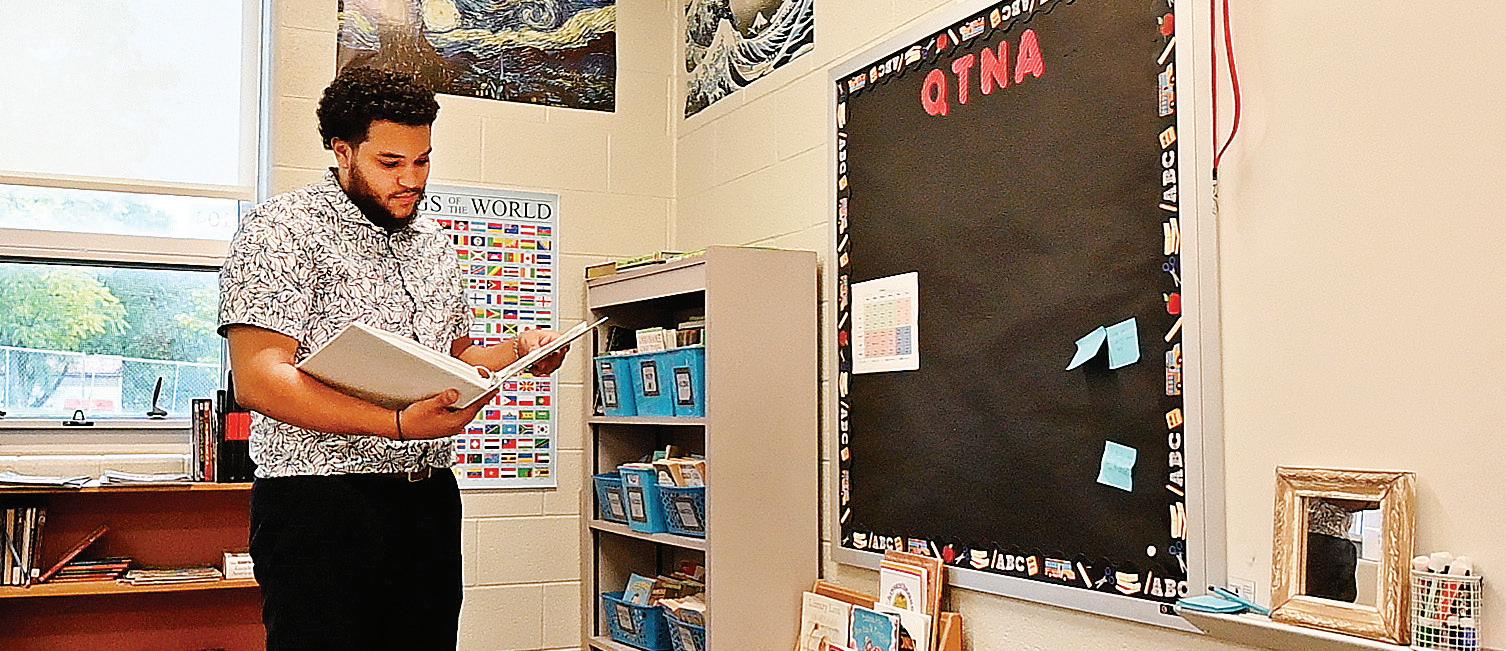
9Penn State Education Features
Photo: Peter Terpstra
Brandon Reed-Porter, who attended Infinity Charter School as a child, now teaches at the institution that is oriented toward the needs of gifted children.
“We need people who care about improving the reality that we are currently in and especially Black men, we need men in this field. We need people of color in this field. We need diverse individuals so people can look up and see and say, ‘I can be anything that I want to be.’ It’s not just people of color and it’s not just men that we need. We need a broad spectrum of perspectives, of people that children can look up to and say ‘I want to be like that.’”
— Brandon Reed-Porter
Educational Leadership program helps grow teacher capacity
By Stephanie Koons
ThePenn State College of Education’s Educational Leadership program prepares outstanding leaders and scholars committed to the continuous improvement of educational systems. Through its curriculum, training and partnerships, the program is tackling head-on the nationwide teacher shortage that is hitting Pennsylvania particularly hard.
“We’ve had, for over a decade, a teacher leadership program,” said Gerald K. LeTendre, H.L. Batschelet Chair of Education and professor-in-charge of the Educational Leadership program. “We don’t train new teachers, that’s (the Department of Curriculum and Instruction’s) job. But we offer a master’s in teacher leadership and the Pennsylvania Department of Education (PDE) endorsement in teacher leadership. And the curriculum is really focused on helping teachers develop their own inquiry/research skills and helping them get the tools to affect change.”
The mission of the Educational Leadership program is to “positively impact educational systems through high-quality scholarship, rigorous instructional practice and equitable partnerships.” The program also has a vision of playing an integral role in promoting excellence, equity, antiracism and social justice in education. Graduates of the program are prepared to pursue or continue careers in PreK-12 education, academia, research and/ or educational policy in the area of educational leadership.
In addition, the Educational Leadership program prepares teachers to become principals in its highly ranked online principal preparation through Penn State
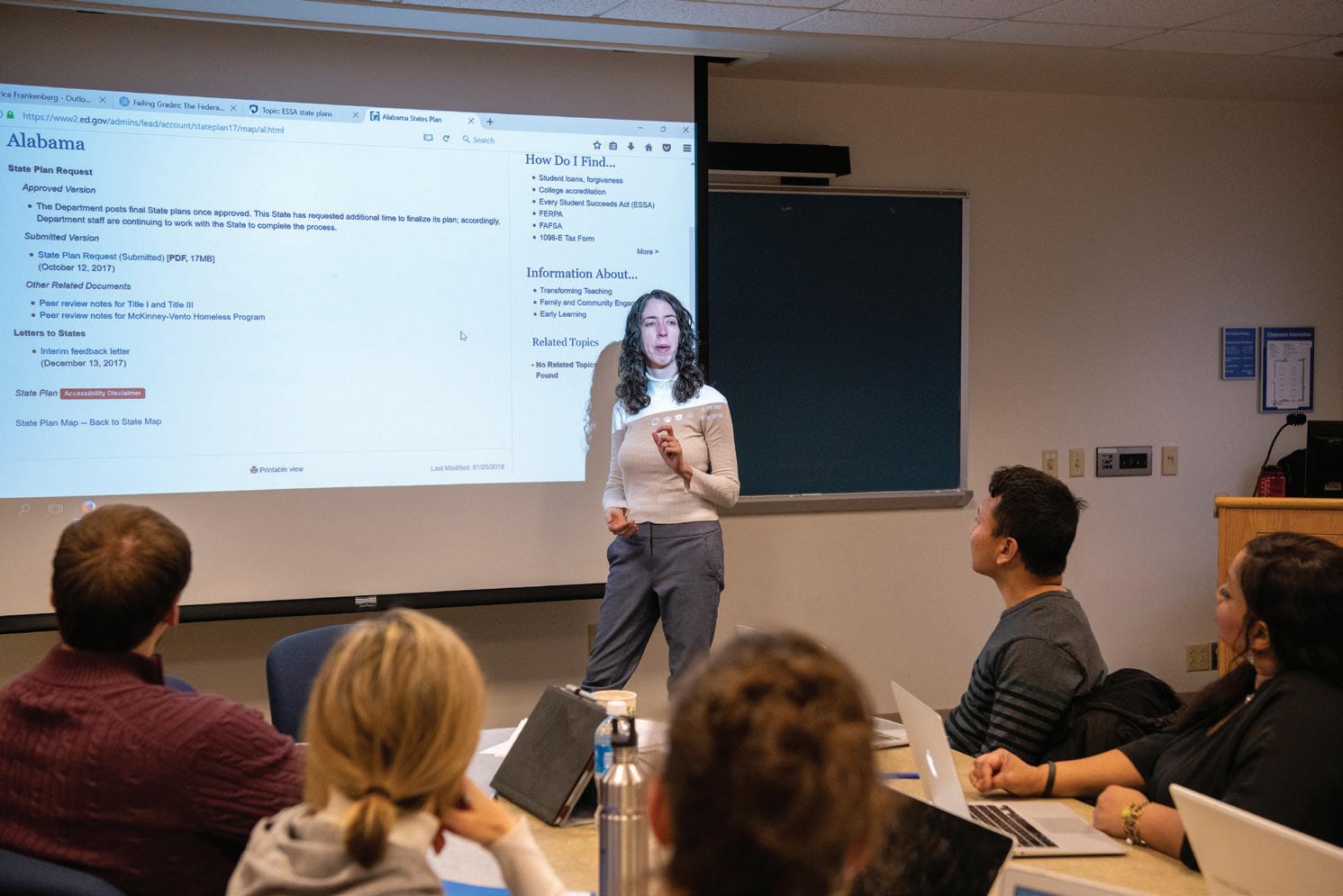
World Campus. According to Ed Fuller, associate professor of education (educational leadership), research has shown that principals play an important role in retaining teachers in the profession by creating positive working conditions for teachers.
“The Educational Leadership program builds the capacity of aspiring leaders to support their teachers and develop positive working conditions to help teachers remain in the profession,” Fuller said.
The Educational Leadership program is poised to elevate the teaching profession in large part through its unique partnership with the Pennsylvania School Study Council (PSSC), LeTendre
said. Founded in 1947, the PSSC is a partnership between Penn State and member school districts, intermediate units, and career and technology centers. PSSC is dedicated to improving public education in Pennsylvania by providing up-to-date research information, professional development activities, and technical assistance that will enable its members to provide top quality educational services to students.
“Our faculty are partnering with effective principals to offer course work that is truly competencybased, focused on real-world problems and supported by coaching by principals identified in the field as highly effective,” said Peggy Schooling, professor of practice in educational leadership
10 Penn State Education Features
Photo: Annemarie Mountz
Erica Frankenberg, professor of education (educational leadership and demography), leads a graduate class in educational leadership in the College of Education. The mission of the Educational Leadership program is to positively impact educational systems through high-quality scholarship, rigorous instructional practice and equitable partnerships.
and executive director of PSSC. “Effective school leaders then have greater skills and resources to develop innovative strategies to address teacher recruitment, selection, induction and retention not only as teachers enter the profession but long-term as well by building career ladders that develop teacher leaders and future school leaders.”
The Educational Leadership program and PSSC recently applied for a principal preparatory grant through PDE that will engage rural school district leaders in a consortium to address the specific needs of rural school leaders and their communities. At the same time, Schooling said, the project will focus on developing a collaborative partnership between Penn State and professional associations that will “strengthen how we prepare leaders for the future.”
“Historically, leadership preparation programs have not always had strong collaborative partnerships with the field,” said Schooling. “It’s our hope that we can do a better job of bridging theory and practice in onboarding new school leaders and retaining and developing more experienced leaders.”
The number of certified educators in Pennsylvania is currently at crisis levels, according to recent news reports. Just 6,000 new teachers were certified last year, down from about 20,000 a decade ago. In addition to a shortage of teachers, schools are dealing with dwindling numbers of school support staff such as bus drivers, nurses and paraprofessionals — a crisis that was exacerbated by the COVID-19 pandemic. The teacher shortage crisis in Pennsylvania is in line with a larger national trend, as reported recently by The Washington Post, which has led to states such as Florida and Texas taking measures such as switching to four-day school weeks and asking veterans with no teaching backgrounds to lead classrooms.
Fuller has been analyzing state data on teachers and other educators to identify the extent of the shortages of educators, the distribution of the shortages across schools, and the potential causes of the shortages. His research has shown that primary cause of the teacher shortage in Pennsylvania is a substantial decline in the number of individuals entering Pennsylvania teacher preparation programs and obtaining teacher certification.
“In fact, Pennsylvania now certifies fewer new teachers than the number of teachers on emergency permits in Pennsylvania,” said Fuller.
In addition to the decline in the number of newly certified teachers, he said, teacher attrition also affects the shortage of teachers. In Pennsylvania, teacher attrition has a notable impact in charter schools and in urban schools serving children of color.
“It is important to note that an increase in the shortage of teachers has the most pronounced effect on underfunded schools as well as schools serving high proportions of students living in poverty and students of color,” said Fuller. “In Pennsylvania, these are often the same schools.”
The teacher shortage crisis is inexorably intertwined with politics, according to LeTendre. Teacher salaries in the U.S. are notoriously low compared with other countries, he said, and many districts and states have passed policies restricting what teachers can say about U.S. history and current events.
“It’s a political dynamic and we have to work on changing the political climate and getting officials elected who understand the importance of having a highly paid teacher force,” he said.
In addition, LeTendre said, teacher preparation programs should “provide new teachers with an understanding of the political system and the kind of communication skills needed to
effectively argue their points and to fight back against political forces in the community that they see as being negative.” In the Educational Leadership program, students engage in an inquiry project on an issue in their school district. One of LeTendre’s students had been working on an issue of lack of diversity of books available in her elementary school and did research on how having a diversity of characters in early childhood reading is beneficial to children. She then presented her results to peers and the local school board.
“We really think that by having more active teacher leaders within a school — teachers who are trained to identify the problems they see, collect the data and make presentations to school boards, administrators and peers about how to affect meaningful change — that this will have a more positive impact on teachers and hopefully teaching as a profession,” he said.
School districts can take proactive steps to address the teacher shortage, LeTendre said, by focusing on community-based programs that expose high school students to the profession — which is especially important as teacher labor markets tend to be local.
“Particularly for rural and more isolated school districts, it really makes sense to create pipelines leading back to high school,” he said. The Educational Leadership program has tried to secure tuition discounts for districts involved in Central Intermediate Unit #10, one of Pennsylvania’s 29 education service agencies.
“Given the tuition costs, it’s really incumbent upon universities to think about resources such as scholarships and tuition discounts to incentivize people to go into teaching,” LeTendre said, adding that those types of programs could be particularly beneficial to first-generation students. “Local community and university partnerships could be really important.”
11Penn State Education Features
Rehabilitation and Human Services program fights disability stigma
By Stephanie Koons
ThePenn State College of Education has a mission to “change education by educating for change” but the classroom isn’t the only setting where students can be agents of progressive social change. The Rehabilitation and Human Services (RHS) program offers students opportunities to advance social justice from classroom to community by advocating for people with a wide range of disabilities.
“The major and profession have all been situated with the philosophy of pushing for rights for people with disabilities, having a social justice lens,” said Deirdre O’Sullivan, associate professor of education (rehabilitation and human services) and professor-in-charge (PIC) of the RHS major, as well as the coordinator for the RHS minor and the Addictions and Recovery minor.
For people who have a disability and are part of another minoritized group, that combination of factors can further marginalize them socially, O’Sullivan said.
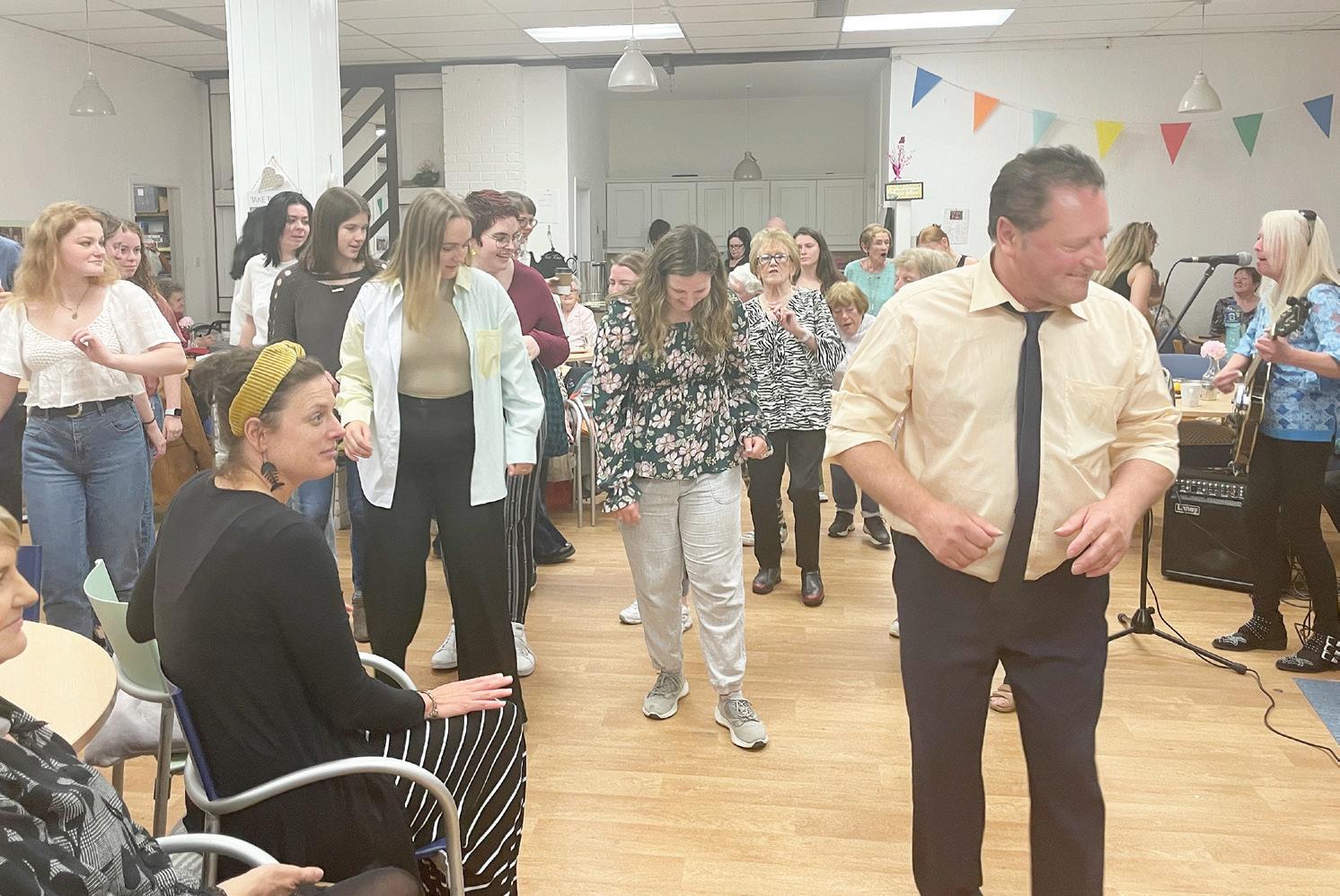
“We recently made some revisions to the curriculum to better align with the changing demands of the field, and to better prepare our students to be active change-agents working in the systems where they will be employed,” she said. “These changes also align with the College of Education and our department’s strategic plan, vision and mission.”
The RHS major helps prepare students for entry-level positions in a variety of human service settings, particularly settings that provide services to persons with physical, emotional or mental disabilities. RHS students learn a variety of professional skills,
including advocating for others; conducting educational and related support groups; developing client treatment plans; identifying and using community resources; and resolving conflicts. Graduates work in a variety of settings including community mental health programs, group homes, schools, drug and alcohol programs, hospitals and medical settings, corrections facilities, and rehabilitation centers.
“I consider the RHS program the college’s best-kept secret,” said Jim Herbert, professor of education (counselor education and rehabilitation and human services) and former PIC of the RHS program. “Students may want to help children, then have their first experience in the classroom and realize teaching is not for them. The cool thing is, those students don’t have to leave the College of Education. We can still help them achieve their goals as far as working with children and
adolescents within schools but not necessarily as teachers. Or, if they wish, explore a different population or work setting that will improve the quality of life for others.”
The RHS program is believed to be the first program of its kind in the United States. The late Ken Hylbert founded the program, then known as “Rehabilitation Education,” in 1958 with a vision for creating an undergraduate curriculum that would meet the needs of various disability groups.
Two areas in which the RHS program has been a pioneering force in recent years, Herbert said, are corrections rehabilitation and employment and transition.
Under O’Sullivan’s leadership, Herbert said, RHS faculty have built coursework around corrections rehabilitation and last year, welcomed a new faculty member, Brandy Henry, assistant professor of education (rehabilitation and
12 Penn State Education Features
Photo: Provided
RHS students learn a new line dance from participants at Friends of the Elderly during the Culture and Disability study abroad program in Ireland during spring 2022.
human services) with expertise in that area. Henry’s research documents social determinants of incarceration and health disparities of criminalized populations, with a focus on trauma, mental health and substance use disorders.
Divine Lipscomb, who graduated in May 2022 with a bachelor’s degree in RHS, is a formerly incarcerated individual who has forged a new path with the resources offered through the program. In fall 2018, he transferred from the College of the Liberal Arts to the RHS program in the College of Education.
“RHS and the College of Education were a better fit for me as I believe in the transformative power of education,” he said. “In addition, RHS allows students to learn how to advocate for their clients in a society that still holds stigmas about disabilities.”
While it has been challenging at times for Lipscomb to navigate the intersections of being formerly incarcerated and a Black male, he said the program allowed him to “lean into my natural sense of advocacy.” He became president of the Students Restorative Justice Initiative, the advocacy arm of the larger Restorative Justice Initiative, Penn State’s Prison Education program.
Lipscomb, now a master’s student in clinical rehabilitation and mental health, rounded out his RHS experience with an internship with CentrePeace, a reentry service organization in Central Pennsylvania. In his role, he assisted in re-creating and co-facilitating the Centre County Reentry Support Group, which works to “support individuals experiencing different levels of community engagement or lack thereof after incarceration.”
While people with disabilities face all types of social barriers, said Herbert, they are particularly disadvantaged in the employment realm. In 2021, according to the U.S. Bureau of Labor Statistics, 19.1%
of persons with a disability were employed compared to 63.7% for persons without a disability.
Since 2019, the RHS program has taken a proactive role in expanding Penn State’s commitment to creating inclusive learning opportunities for people with disabilities through its WorkLink program. WorkLink provides the opportunity for individuals with Intellectual Disabilities (ID) to participate in postsecondary experiences and education alongside their peers. Allison Fleming (associate professor, rehabilitation and human services) and Wendy Coduti (former associate professor of education) initially developed WorkLink. The program is intended to enhance work and independent living skills for individuals with ID.
A key component in the RHS curriculum is its internship requirement. Internship settings can include public, privatenonprofit, and for-profit RHS agencies and facilities such as rehabilitation hospitals, schools, mental health programs, correctional institutions, and children and youth service agencies.
“As long as (students) are supervised by a professional who has a bachelor’s in a related field, they can do their internship in any
setting that is aligned with our vision and mission and learning objectives to support people with a range of life barriers,” said O’Sullivan.
Maimouna Fall, a December 2021 graduate of the RHS program who is now pursuing an M.Ed. in higher education at Penn State, said the program provided her tools and resources needed in the real world. She did her internship with Penn State Career Services in the Office of Student Affairs.
“I loved the internship aspect so much because it honestly let the students choose and experience their interest in their field of choice,” said Fall. “All the students may have gone through the same classes and had similar discussions, but we all could take those tools and apply them any and everywhere.”
Besides internships, RHS faculty find other ways to support student learning outside the classroom. Katie Kostohryz and Pia Smal, associate teaching professors of education (RHS),have co-taught the Culture and Disability educational abroad program in Ireland for the past five years. The program enables students in RHS and other majors to learn about disability and social justice from a global perspective.
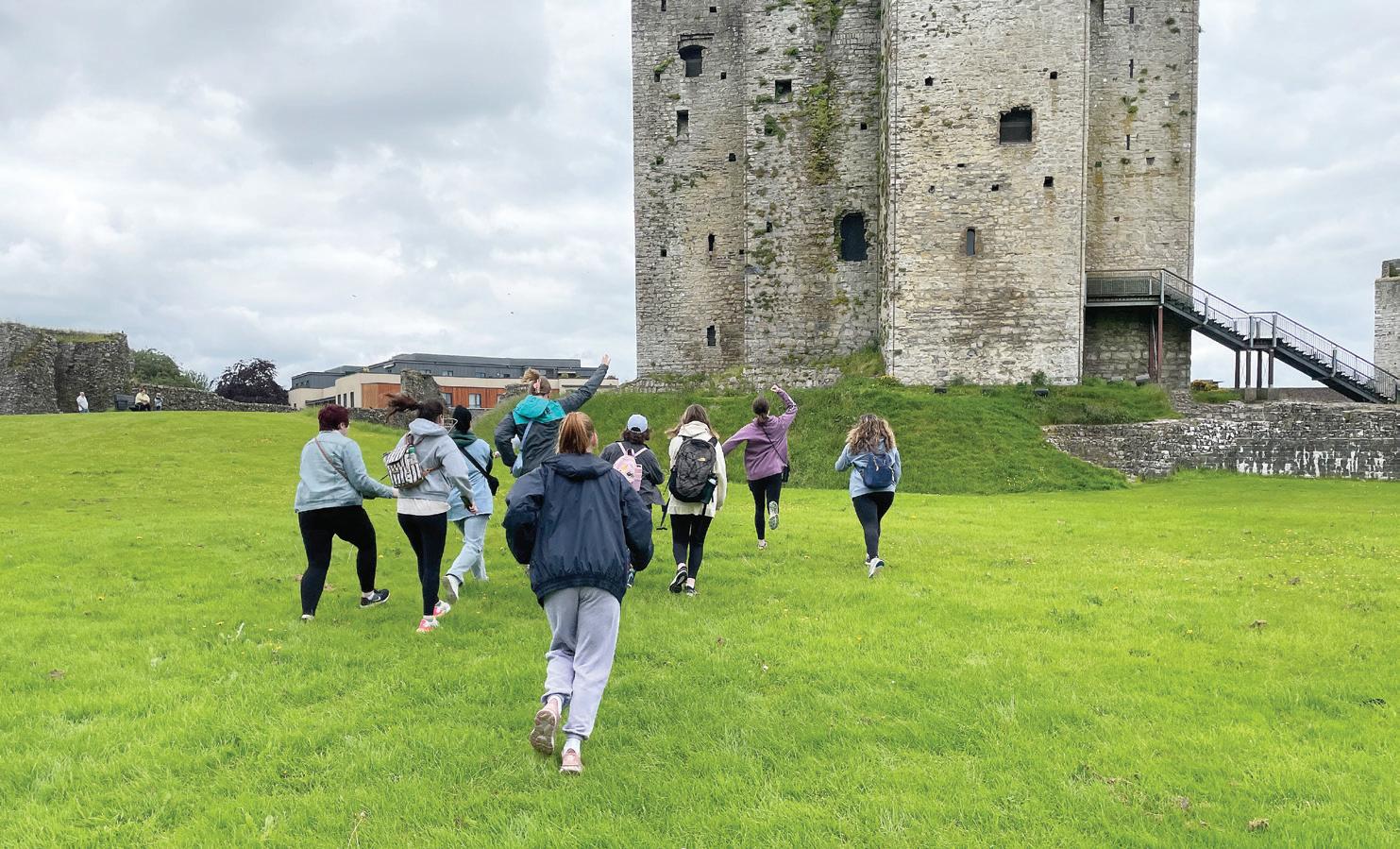
13Penn State Education Features
Photo: Provided
RHS students storm a castle in Ireland after an intensive three weeks of learning in the Culture and Disability study abroad program in spring 2022.
Families learn about the science in their community with augmented reality
By Brian Cox
HeatherToomey
Zimmerman, professor of education in the Penn State College of Education Department of Learning and Performance Systems (LPS), is leading a project exploring using augmented reality to enhance rural families’ learning about local science.
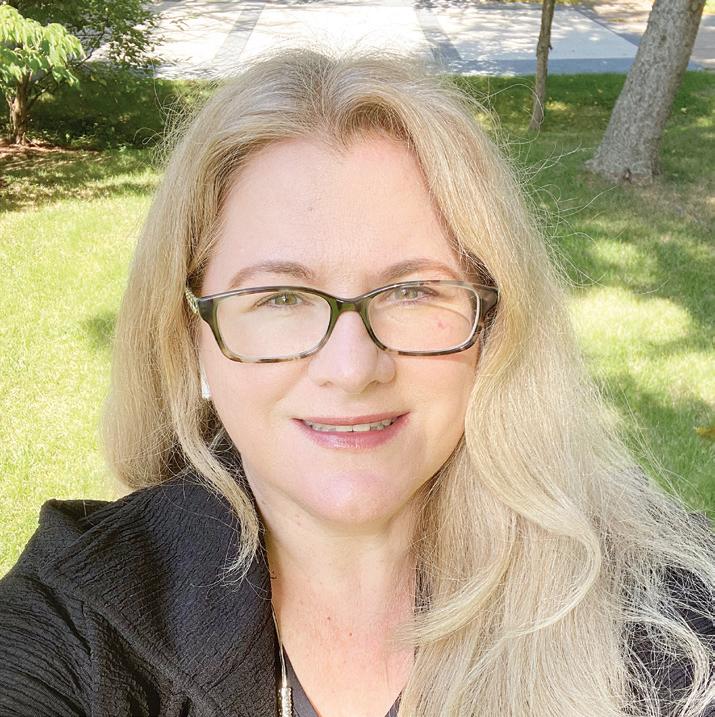
Zimmerman and co-director Susan Land, head of the LPS department and professor of education, developed augmented reality apps for two outdoor learning centers — the Arboretum at Penn State and Shaver’s Creek Environmental Center in Huntingdon County. Using tablet computers, families with children ages 5-12 have an immersive educational experience while visiting.
“At the start of the project, Susan and I brainstormed how we could use mobile computers
to help families learn about the science in their everyday lives in an engaging way,” Zimmerman said. “We realized augmented reality was a tool that could allow us to create interactive walking tours for different community sites.”
Their team designed interactive stories that layer content, images, animations, filters and photos for specific spaces. The information reveals the story of the science in that community.
At the Arboretum, families visit the children’s garden or walk a pathway in the pollinator and bird garden. At Shaver’s Creek, participants follow a nature trail. At both, GPS is used to detect locations where the app delivers interactive experiences — one about pollinators native to central Pennsylvania and another about how unique rock and water iterations shaped Pennsylvania.
“Our children’s garden app helps support families’ imagination about geological history,” Zimmerman said. “They wonder, ‘If I was standing here 480 million years ago, what would Pennsylvania look like?’ Because Pennsylvania was covered by a shallow sea at that time, a blue filter comes through the tablet’s screen with prehistoric sea creatures swimming.
grant from the National Science Foundation, the goal is to develop resources for rural families, which Zimmerman said is needed due to a relative lack of museums and science centers in rural areas and the importance of learning about science related to local ecosystems. Once research is concluded, the apps will be available publicly.
Other project partners include the Teaching and Learning with Technology unit, the Center for Immersive Experiences and the Center for Pollinator Research.
Photo provided
As families use the augmented reality app, various overlays, images, filters and other information will appear once they arrive at specific locations. This can serve to allow students to see what cannot be seen without aid.
“At the Arboretum, families enter a day of the life of a bee. As they approach a beehive, they wonder how a bee would lay eggs inside of it. The app uses augmented reality to show what the inside looks like. By incorporating augmented reality, families can see aspects of environmental science they couldn’t without support, but a scientist would know.”
Funded by a $1.5 million
“To help people take care of their community, they must know about where their water is, what rocks make up their soil and what pollinators need to live in gardens and farms to support crops,” Zimmerman said. “The interactive app helps them learn about the science behind all these things in a fun, story-like way.
“What is most important about this work is that it focuses on learning science that’s locally relevant. This project is a model for teaching about the big ideas of science in ways that are connected to the places families experience every day.”
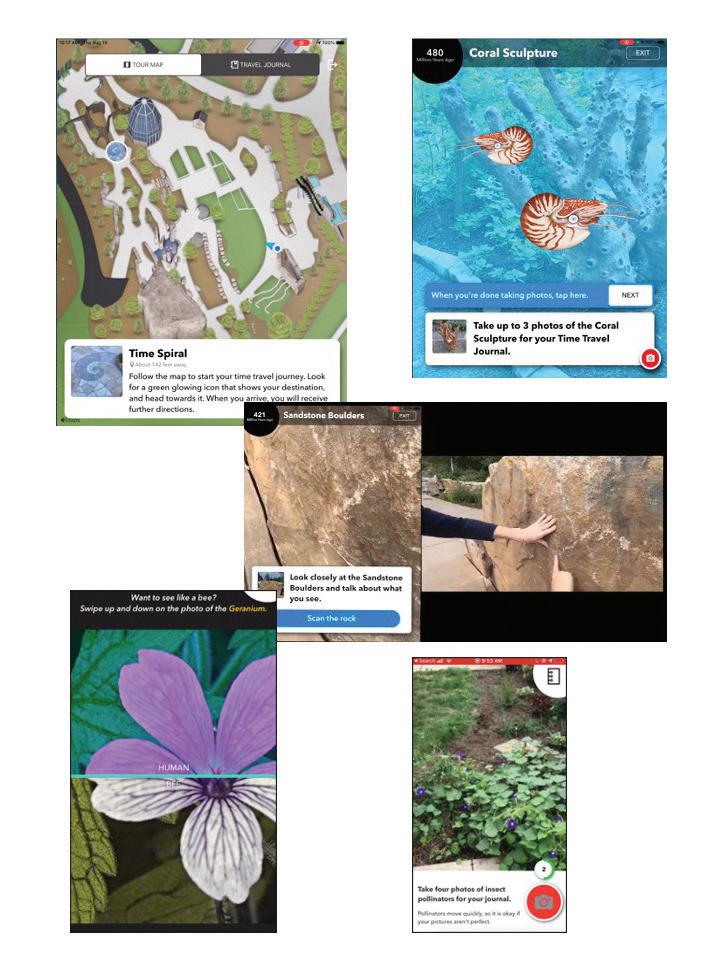
14 Penn State Education Research
Heather Toomey Zimmerman
Researchers develop framework for doctoral program assessment
By Stephanie Koons
Doctoral programs at universities prepare students, particularly those in scientific disciplines, to become innovative leaders in their fields. However, there hasn’t been a standardized method for evaluating how effective those programs are in achieving their goals. A group of Penn State researchers, including a College of Education faculty member, are involved in a project to develop a framework for the assessment of doctoral students in the natural sciences.
“(The project) has really brought attention to the need for academic programs to be engaged in that constant process of gathering formative assessment information about your work and your program and how you’re moving forward, and then using that information for continual improvements,” said Peggy Van Meter, associate professor of education (educational psychology) and director of Undergraduate and Graduate Studies in the Department of Educational Psychology, Counseling and Special Education.
Working with colleagues in biomedical science, Michael Verderame, senior associate dean of the Graduate School at Penn State, developed the Ph.D. Training Assessment Framework (PTAF). The goal was to design a developmental framework that covers the competency areas that a student needs to develop in their doctoral program. The initial design of the framework was published in 2018. More recently, Verderame began working with Van Meter and the pair were awarded a $250,000 grant by the Huck Institutes of the Life Sciences for a two-year project. The goal of the project is to validate the structure of the PTAF and how the assessment tool can be used to
support Ph.D. education.
“If you ask a member of a graduate program about the quality of the education they provide, they will undoubtedly speak to the high quality of their program, but few programs have systematically reviewed their program against a set of commonly accepted standards,” said Verderame. “Once validated, this tool could be used by the program’s faculty in a systematic assessment of the education offered in a program, potentially identifying areas the program might need improvement for the benefit of future students.”
The tool the researchers are assessing, PTAF, consists of 10 competency areas with 44 subcompetencies embedded in those. The areas of competency outlined in the framework include the ability to think deeply and critically about specific field; while the subcompetencies include the ability to recognize important questions, interpret data and design a program of research.
The research team is currently
finishing the first study, Van Meter said, with a total of three studies planned for the academic year. Using qualitative methodology, the researchers are conducting individual and focus group interviews with faculty members in both the natural sciences and education. The final year of the project will focus on interpretation of the data collected. The goal of this project is to finalize the PTAF, including the competency and sub-competencies, and make recommendations for best practices in using the tool to assess graduate education.
According to Van Meter, the academic community currently lacks a validated tool that can be used to “support the educational work we do with our grad students.” One of the potential uses of PTAF is to support mentoring work by helping faculty be aware of various areas for student development — not only in academic areas but also in soft skills like communication and networking.
Additionally, Van Meter said, PTAF has the potential to develop a “shared language” across different academic disciplines. The tool is intended to aid graduate programs that have a goal of helping students develop into career scientists. However, the researchers have defined “career scientist” broadly as anyone who is involved in the conduct of original research from inception through dissemination.
“When we think about career scientists, we need to have a wide appreciation for the varied methodological approaches people use,” said Van Meter. “I think the tool has the potential to draw connections between siloed units and engage people in conversations.”
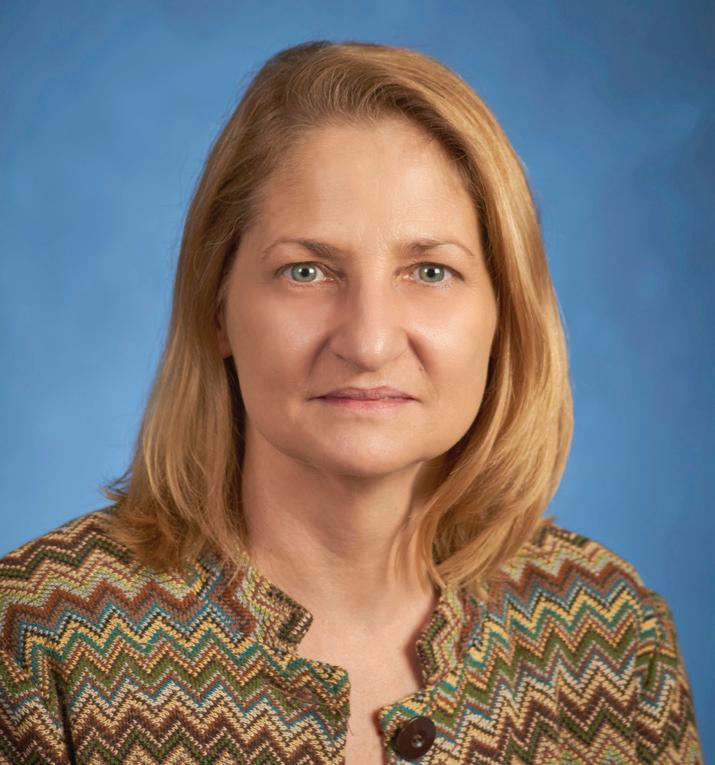
15Penn State Education Research
Peggy Van Meter, associate professor of education (educational psychology), is collaborating with other Penn State researchers to develop a framework for assessing doctoral students in scientific disciplines.
Emergent bilinguals lost vital instruction during remote learning, study shows
By Brian Cox
Emergent
bilingual learners — students developing proficiency in English and another language — in kindergarten through second grade saw significant loss of languagerich instruction during remote learning caused by the COVID-19 pandemic, according to a study by Amy Crosson, associate professor of education in the Penn State College of Education.
The research by Crosson and Rebecca D. Silverman, associate professor at Stanford University’s Graduate School of Education, was recently published in the International Literacy Association’s “Reading Research Quarterly.”
The “diary study” was conducted during school closures. Teachers submitted daily examples of literacy instruction with emergent bilingual children using photographs of literacy activities, video reflections on how the activities played out during remote instruction and observations about communications with multilingual families. Teachers also were asked to compare how they engaged emergent bilingual students in literacy activities in-person versus during remote instruction.
“I wanted a method that would allow me to understand how teachers were experiencing remote instruction, what decisions they were making on a day-to-day basis, and how literacy instruction was playing out with their children,” Crosson said. “I didn’t want to take just a broad look, I wanted to know what was happening day-to-day.”
By using a daily diary method, Crosson said they got a more nuanced assessment of how much language-rich instruction — activities such as book discussions
Using the dscout smartphone app, 50 teachers from 10 different states filed daily reports over the amount of language-rich instruction their students received over a two-week period of remote learning caused by the COVID-19 pandemic.
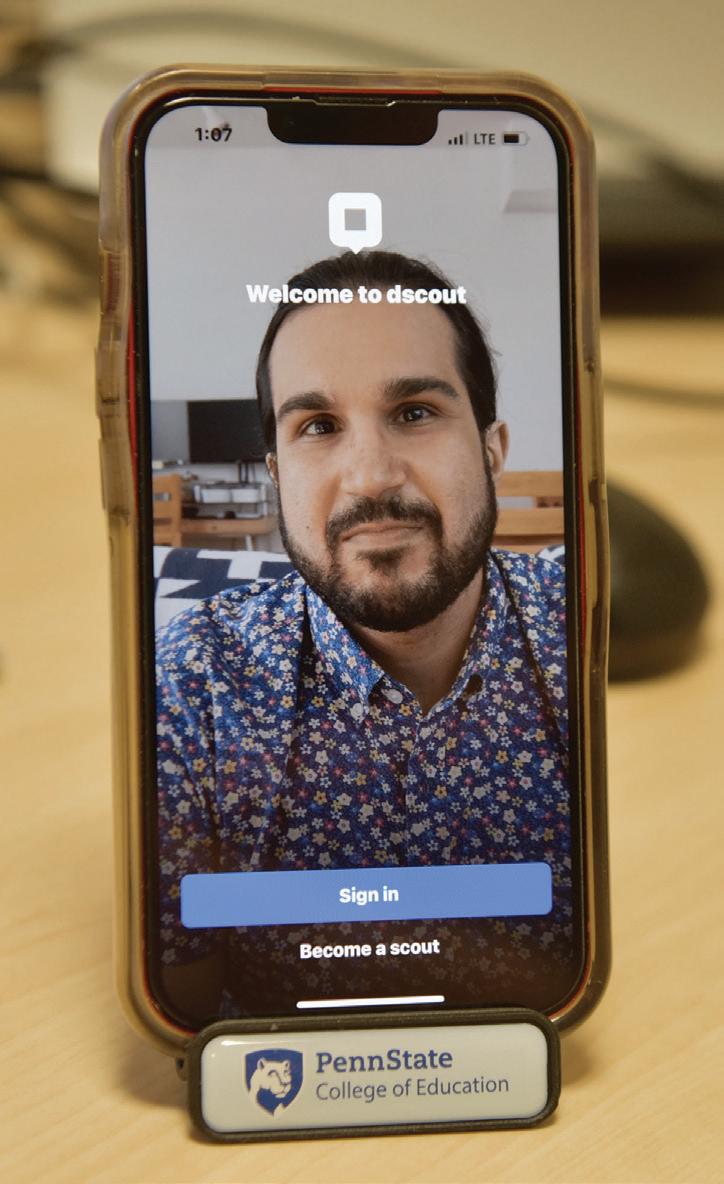
and narrative writing Crosson said are vital — emergent bilingual students were missing by learning remotely.
“One of the major findings is with respect to foundational, code-related skills like learning to decode words, teachers reported a small reduction in instruction,” Crosson said. “In contrast, it was those language-rich skills that were severely disrupted during remote instruction. Teachers reported providing much less instruction that would engage kids in book discussions and extended writing and building knowledge of word meanings. Foundation skills are critical, but also these language-rich interactions are essential to long-
term literacy outcomes.”
Fifty teachers from 10 states used a smartphone app to report. In addition to the general daily reporting, participants also chose three “focal” children and described how language-rich activities affected them.
Crosson said Penn State’s outreach helped her connect to many teachers interested in taking part in a study using an uncommon method.
“The network the Penn State College of Education has with educators and administrators was important — even well beyond Pennsylvania,” she said. “That network was part of the approach that helped me reach so many teachers in so many places. I didn’t realize just how incredible that advantage would be.
“Methodologically, this research expands the way we can we try to understand teachers’ relationships with families and how teachers are making sense of the challenges to instruction and the innovations and what’s successful on a day-to-day basis.”
The challenge is how to apply what has been learned now that students are back to in-person learning.
“The key takeaway is thinking ‘What do we do now?’” she said. “Where do we need to focus our energies? Where do we need to funnel resources? We ought to be thinking about that population of emergent bilinguals in the early elementary grades and especially thinking about how to funnel resources toward language-focused literacy instruction that was disrupted during that time and putting a lot of effort there.”
16 Penn State Education Research
Photo: Brian Cox
Study finds parental help with homework has no impact on student achievement
Parental help with homework has no significant impact on children’s academic achievement in elementary school, according to Penn State College of Education researchers.
“There is no statistically significant association between parental help with homework in elementary school and children’s achievement, period,” said Katerina Bodovski, professor of education (educational theory and policy).
Bodovski is lead author of a new paper, “Parental Help With Homework in Elementary School: Much Ado About Nothing?” that was recently published in Journal of Research in Childhood Education. The study, which draws on two nationally representative datasets, showed no statistically significant association between parental help with homework and student achievement. Further, the association between parental help with homework and achievement did not vary by parental level of education or child’s achievement level.
Bodovski’s co-authors on the paper are Ismael G. Muñoz, a recent doctoral graduate in the Department of Education Policy Studies (EPS); and Ruxandra Apostolescu, a doctoral candidate in EPS.
According to Bodovski, parental help with homework has long been hailed by educators and policy makers as an effective mechanism to help children succeed in school. In fact, the U.S. Department of Education promotes homework as an “opportunity for children to learn and for families to be involved in their children’s education.” On the other hand, Bodovski said, a number of studies, including an article by University of Delaware Professor Laura Desimone, have demonstrated a negative impact of parental help with homework on children’s achievement. The negative relationship has been explained by the fact that parents tend to help struggling children and that their efforts were not enough to overcome the students’ deficiencies.
“If the purpose of homework is for the child to practice some skills or knowledge they learned in school, that is lost if the parent is doing the work,” Bodovski said.
Read the full story at https://bit.ly/3JFKoNK online.
Study finds white children more likely
to be overdiagnosed for ADHD
A new study led by Paul Morgan, Harry and Marion Eberly Faculty Fellow and professor of education (educational theory and policy) and demography, and published in the Journal of Learning Disabilities, examines which sociodemographic groups of children are more likely to be overdiagnosed and overtreated for ADHD.

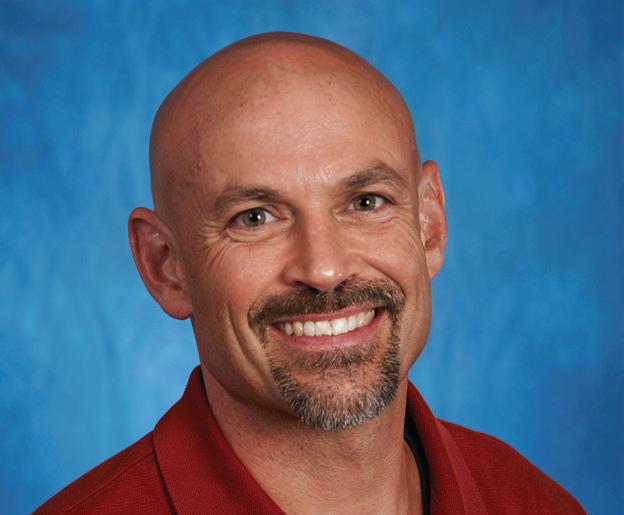
The researchers analyzed data from 1,070 U.S. elementary school children who had previously displayed above-average behavioral, academic or executive functioning the year before their initial ADHD diagnoses.
The team said those children were considered unlikely to have ADHD by the researchers because children diagnosed and treated for ADHD should display chronically inattentive, hyperactive or impulsive behaviors that impair their functioning and result in below-average academic or social development.
A problem with ADHD overdiagnosis, Morgan said, is that it contributes to stigma and skepticism toward those experiencing more serious impairments.
“It undermines a confidence in the disorder,” he said. “If anyone can be diagnosed with ADHD, then what is ADHD? For those who have significant impairments, they may experience greater skepticism about the condition. Mental health resources are already scarce. Those with serious impairments could lose out.”
In addition, said Morgan, previous research has shown that among children with no or mild ADHD symptoms, being diagnosed with the disorder may result in lower academic achievement and behavioral problems during elementary school, perhaps because these children may be more likely to compare themselves with children without disabilities, and so adopt negative ability beliefs that interfere with their learning and behavior.
He added that overtreatment of ADHD unnecessarily exposes children to medication’s negative side effects, such as sleep problems or decreased appetites.
Read the full story at https://bit.ly/3U47D8X online.
17Penn State Education Research
Paul Morgan
Katerina Bodovski
Zembal-Saul helping schools implement new science education standards
By Brian Cox
Carla
Zembal-Saul, professor of education and head of the Department of Curriculum and Instruction in the Penn State College of Education, has spent her career pushing educational boundaries.
Some of her more recent work has had a direct impact on students in kindergarten through fifth grade in the State College Area School District (SCASD). Zembal-Saul has inspired the district to write a new science curriculum that prioritizes student voice and agency by putting the tasks of asking questions and constructing explanations in the hands of students.
Her efforts have drawn admiration from those with whom she is working.
“One of her super-powers is her knowledge of the Next Generation Science Standards (NGSS) and her deep understanding of best teaching practices,” said Kimber Hershberger, a former SCASD teacher leader in science who has worked with Zembal-Saul. “She is a strong advocate for empowering students as knowledgebuilders. For instance, she taught us to use a strategy of gathering wonderings from students which tap their curiosity. Doing this strategy during the beginning of the unit allows students to have a voice in what questions will guide further investigations.”
Creating a new curriculum is no easy task, as it takes time, effort and resources. But, Zembal-Saul said, for those willing to take on that work, it is rewarding to be able to shape students’ educational experiences for years to come.
“Curriculum-writing is a herculean task that requires an understanding of big ideas in science, science and engineering practices and how to engage children with them, contemporary frameworks for learning and standards, curriculum writing that supports teacher learning, and more,” Zembal-Saul said.
“I would never recommend that school-based educators take on creating their own curriculum,” she continued. “But SCASD teacher leaders in elementary science are remarkable — they have almost two decades of professional learning in which they implemented new approaches in their classrooms, participated in self-study, and made their learning public locally and nationally through professional meetings and publications.”
A major difference between the framing of the new curriculum and mere hands-on learning is that this approach engages children directly in investigating and
Photos provided Above: Carla Zembal-Saul, professor of education and head of the Department of Curriculum and Instruction in the Penn State College of Education, right, hands Madagascar “hissing”
cockroaches to State College Area School District elementary school students, from front to back, Meadow Burke, Ava Richards, Charlie Zorger and Miles Laskowski during a recent science lesson.
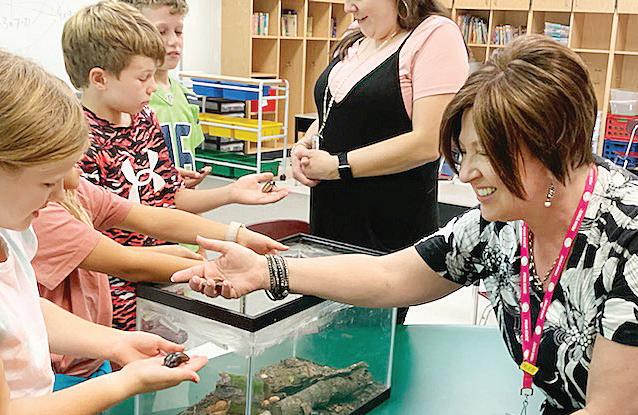
Left: One of the cockroaches sits on the shoulder of student Burke, left, while Richards looks on.
making sense of phenomena. Zembal-Saul said this is important to do with children at this age because of their natural curiosity.
“The elementary years are often neglected,” she said. “Young children are all about ‘why’ and sometimes family members and teachers feel the pressure to answer their questions instead of supporting their inquiry.”
To say changing education has been her life’s work is no exaggeration. Zembal-Saul has spent her career advocating for this evolution in the way science is taught in Pennsylvania and nationally. She even has traveled to Spain and South Africa on multiple occasions to collaborate with educators there to further the cause.
“Advancing practice and research for equitable elementary science education is an ongoing journey for me that has gone from the margins of science education research to just this past year, the publication
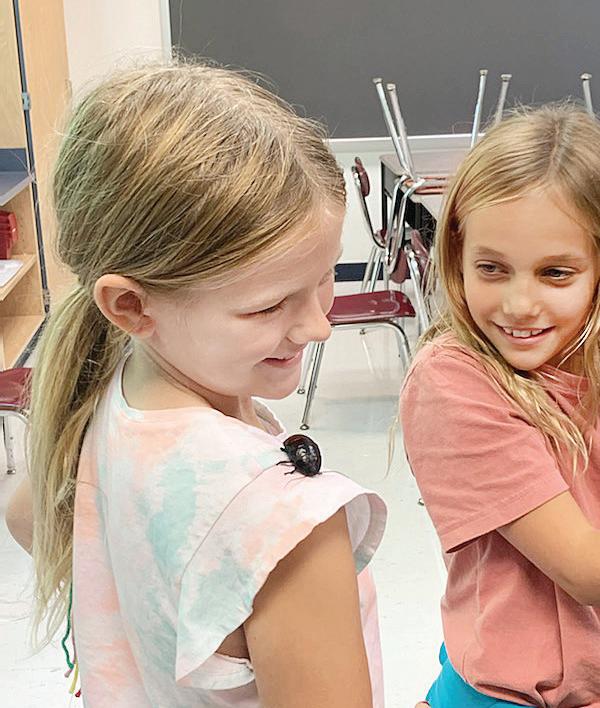
18 Penn State Education Impact
of the National Academies of Sciences’ new report for which I had the privilege of serving on the consensus committee,” Zembal-Saul said. “A central message of the report is that educator and researchers alike should tap into children’s natural curiosity about how the world works, their intuitive methods of investigating and their cultural and linguistic resources. We also need to flip the narrative about elementary teachers and science to draw on their strengths, not focus only on gaps in their science background.”
Hershberger cited an example of that kind of science with third-graders having multiple experiences observing and collecting data about Madagascar “hissing” cockroaches’ physical structures and their functions. Students then use this data to add to a developing explanation for how these interesting critters survive in their environment.
“Often science curriculum merely tells students what the concepts are and has them verify with labs,” Hershberger said. “The NGSS standards emphasize having students use science practices as they investigate. These practices include collecting data, making models, constructing scientific explanations that are supported by evidence. Carla has been instrumental in supporting teachers in learning how to incorporate these practices in the science lessons.”
The local school district is familiar with Penn State and has worked with the University at-large and the College of Education specifically on numerous occasions. But when it comes to advocating for changes both in Pennsylvania and elsewhere, the Penn State name provides cachet.
“I have been supported at Penn State across my 25 years here, advancing from a brand new assistant professor to full professor,” said Zembal-Saul. “Penn State’s reputation as a research university precedes it, providing credibility and opening doors. For example, I was invited to make a presentation to the Pennsylvania State Board of Education in 2019 on the urgency to review and update the state science standards.”
But always at the core of Zembal-Saul’s work are the students, something she plans on always being the case.
“It comes down to the kids,” she said. “I want this for the children and I’m willing to do all kinds of things that look non-traditional on the surface to make that happen. And I am committed to walking the walk with educators, kids, administrators and families in schools and community spaces. The relational part of that work both brings me joy and it’s also what I hope people remember — that I can’t go into a classroom without rolling up my sleeves and joining a small group of students and literally listening to what kids are grappling with and then processing with teachers.
“That’s really what I would like classroom teachers and other educators to associate with my way of being in the world and my impact.”
Campaign to support Office of Education and Social Equity
By Jonathan Altland
With the Thanksgiving holiday fast approaching, preparations are underway for Penn State’s 2022 Giving Tuesday campaigns. To advance its mission of “changing education by educating for change,” the College of Education once again will raise financial support for the Office of Education and Social Equity (OESE).
As the hundreds of students and alumni whose lives have been transformed by the OESE already know, its passionate staff works tirelessly to:
• promote diversity and multiculturalism;
• infuse equity and inclusion across the curriculum and student experiences;
• increase access to post-secondary opportunities;
• support the advancement of outstanding educators; and
• provide underserved and marginalized students a sense of community and a safe space to be themselves.
Building upon the college’s previous Giving Tuesday success, this year’s campaign will incentivize “Champions” — EDU alumni and friends who leverage the power of their own networks to increase their own fundraising capacity.
“The generosity of these contributions, regardless of amount, yield a tangible and immediate impact on students’ lives,” said María Schmidt, assistant dean for education and social equity. “They empower our students to break barriers and to achieve things they never thought were possible. For many, none of this would be possible without the support of alumni, parents and friends. They provide the resources that give students a meaningful, unforgettable and inspiring college experience and affirms our collective commitment to change lives.”
Visit https://raise.psu.edu/givingtuesdayedu to learn how you can lend your support by making an individual gift or by becoming a Champion.
19Penn State Education Impact
Alumni Fellow Pewewardy returns to campus
CornelPewewardy, who earned his D.Ed. in educational administration from the College of Education in 1989, is one of 14 Penn Staters honored this fall with the Alumni Fellow Award, the most prestigious award given by the Penn State Alumni Association.
Pewewardy is professor emeritus of Indigenous Nations Studies at Portland State University and vicechairman of the Comanche Nation. He has a profound belief in the power of Indigenous education and in the power of higher education, and has dedicated his life’s work to bringing those two forces together to improve both.

The Alumni Fellow program is administered by the Penn State Alumni Association in cooperation with the University’s academic colleges, campuses and the Office of the President. Alumni are nominated by a college or campus as leaders in their professional fields and accept an invitation from the president of the University to return to campus to share their expertise with students, faculty and administrators. During his time on campus, Pewewardy gave a book talk, “The Hunt for Red Pedagogy: The Transformational Indigenous Praxis Model.”
Pewewardy retired in 2017 from Portland State University, where he served as director of the Indigenous Nations Studies program. Prior to joining Portland State, he taught at the University of Kansas and was a five-time recipient of the Big 12 Outstanding American Indian Faculty of the Year Award; served as the first academic dean of Comanche Nation College; and founded two transformational, award-winning magnet schools in Saint Paul, Minnesota.
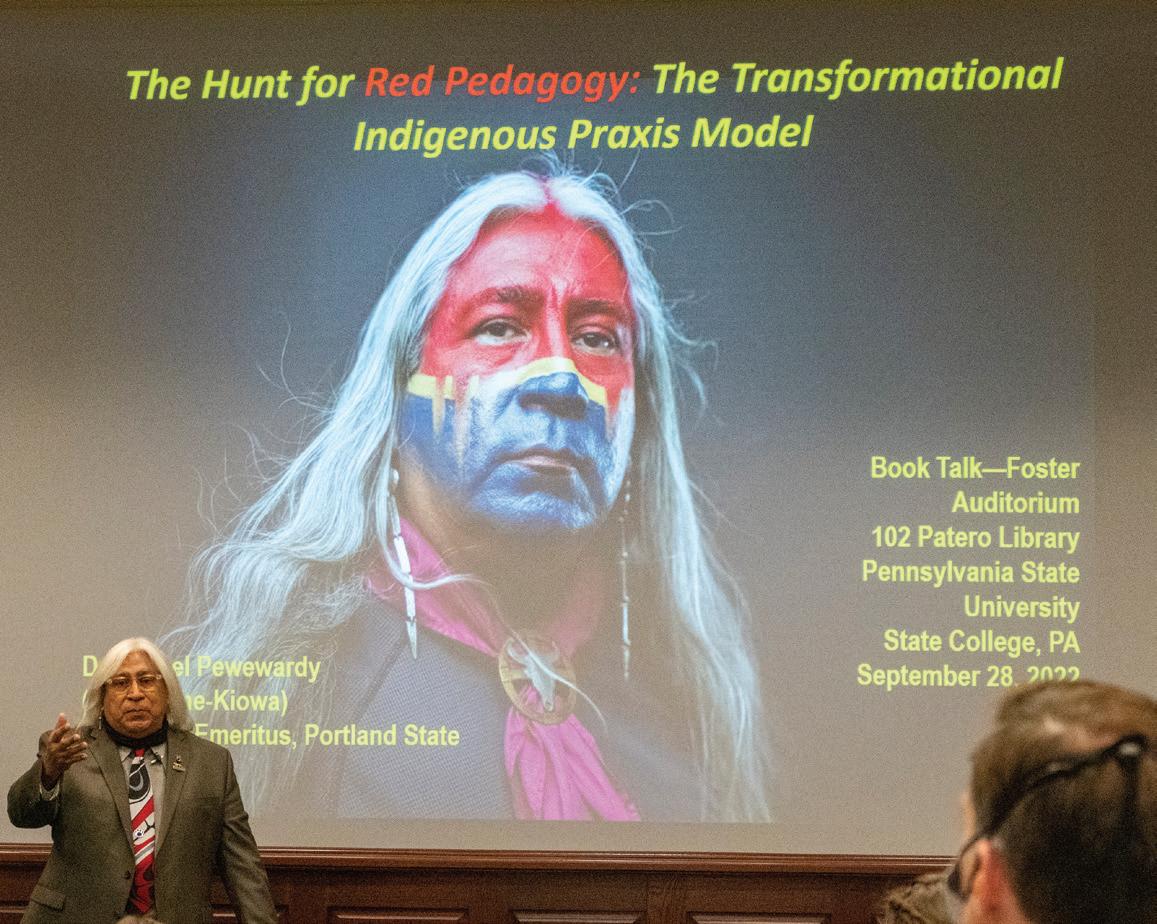
Pewewardy began his career in education as an elementary teacher and principal on the Navajo Reservation in New Mexico. He is a founding member of the National Association for Multicultural Education (N.A.M.E.), which brings together individuals from all academic levels and disciplines and from diverse educational institutions who have an interest in multicultural education.
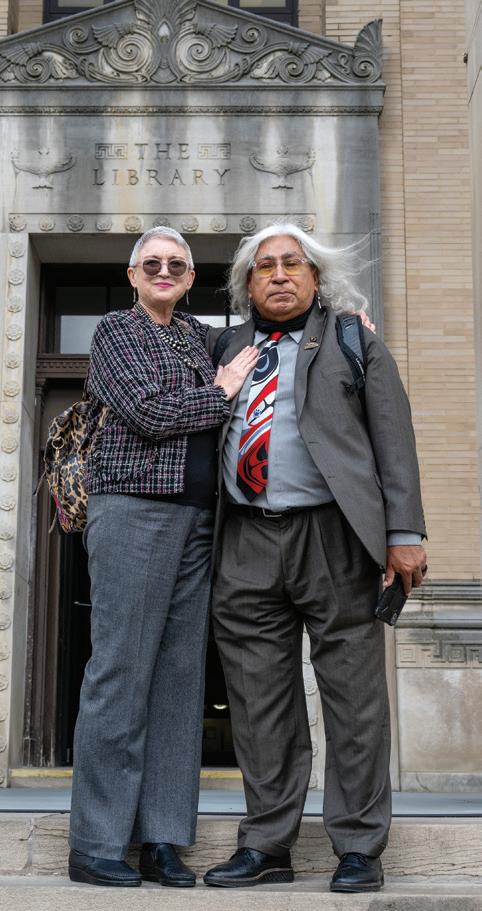
Throughout his career, Pewewardy has been honored extensively for his work, including the National Conference on Race and Ethnicity Suzan Shown Harjo Systemic Social Justice Award (2021),
AARP Oklahoma Indian Elder Honors Award (2019), Oregon Indian Education Association Outstanding Indian Educator of the Year (2017), Portland State University John Eliot Allen Outstanding Teaching Award (2016), N.A.M.E. Carl A. Grant Multicultural Research Award (2011), and Portland State University’s President’s Diversity Award (2011).
He recently was named recipient of the 2022 National Indian Education Association Lifetime Achievement Award for his commitment, dedication and service to students, communities and Native Education.
Pewewardy remains engaged with the Penn State College of Education community, including collaborating with faculty to enhance the American Indian Leadership Program, which was founded in 1970 and is one of the oldest programs of its kind.
20 Penn State Education Alumni
Photos: Annemarie Mountz
Cornel Pewewardy gave a compelling book talk as part of his visit to Penn State to be honored as an Alumni Fellow. Afterward, he and his partner, Nocona Pewewardy, posed for a picture on the steps of Pattee Library, which he said was one of his favorite places on campus when he was a student.
Muchhas been said about change. It’s the only constant. It’s necessary for growth. It drives innovation.
Penn State has experienced a host of exciting changes over the past few months. We started this semester with a new University president, a new athletic director and thousands of new students, faculty and staff launching their Penn State careers at University Park and our campuses across the Commonwealth. In the coming months we’ll see the hiring of a new provost.
In summarizing the College of Education’s mission, Dean Kimberly Lawless has championed the motto: Changing Education by Educating for Change. Truer words were never spoken.
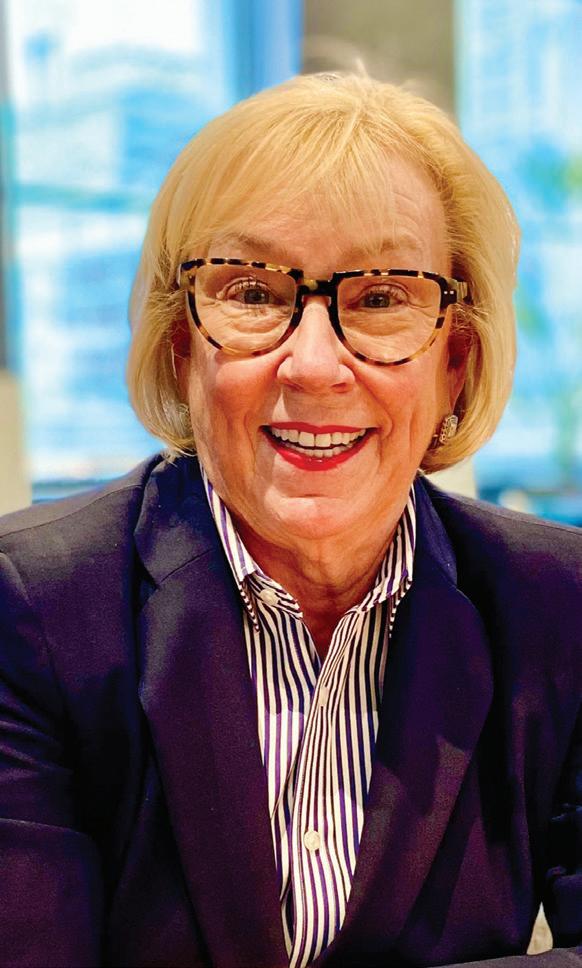
It’s also been said that we, as individuals and collectively, have the power to make change happen. For proof, look no further than the impact donors to the College of Education made during the Greater Penn State Campaign.
From July 1, 2016, through June 30, 2022, our alumni and friends endowed 71 new scholarship funds and increased the average amount awarded to scholarship-eligible students by 42% – that’s a fabulous change!
We created or named four exciting new learning and outreach spaces, including the Gay and William Krause Learning Space, the Leonhard Language and
Literacies Studio, the Dr. Edwin Herr Clinic and the John H. Martinson STEM Education Laboratory. Our annual Giving Tuesday campaigns raised $28,638 in support of the Office of Education and Social Equity (OESE). Overall, passionate philanthropists contributed over $38.2M to the College of Education – the most impactful campaign performance in our history.
These gifts – YOUR gifts – to the College of Education impact not just the beneficiaries of your generosity, but the thousands of others with whom those educators, counselors and policymakers, current and future, will engage over the course of their careers. That is changing the world.
This Giving Tuesday (Nov. 29), I hope you’ll join the DDC in supporting the life-changing work taking place in OESE. See the feature on page 19 for more information. Thank you.
As for me, I am proud to serve as the new chair of the Dean’s Development Council. WE ARE committed to supporting the college’s strategic plan, its fundraising goals and objectives and the dedicated staff in the Office of Development.
While we embrace the opportunity to facilitate change, we remain steadfast in our belief in the transformational power of education and educators, of philanthropy and of the diverse, ever-expanding community of donors we represent.
And that will never change. All the best. BE WELL.
Nominate outstanding alumni for excellence awards
College of Education alumni are honored with awards from the college’s Alumni Society as well as from the Penn State Alumni Association. The College of Education Alumni Society supports awards in several categories:
• Alumni Excellence. This is the highest honor bestowed upon alumni of the College of Education, recognizing careerlong, sustained excellence of contribution and achievement in the nominee’s profession.
• Outstanding Teaching. This award recognizes an exemplary
individual in a full-time teaching capacity in the education profession.
• Leadership and Service. This award recognizes those alumni who have distinguished themselves in their chosen profession, in or out of the field of education.
• Outstanding New Graduate. This award recognizes recent graduates who have distinguished themselves in their new careers.
• Service to Penn State. This award recognizes those alumni and friends who have made
significant contributions of time and talent to the college and/or the University.
• J.E.D.I. (Justice, Equity, Diversity and Inclusion). This award recognizes alumni who showcase exemplary insight and fortitude in workplace and/or community diversity.
Nominations are accepted throughout the year, with recipients chosen each spring.
For information, and to submit a nomination, visit https://ed.psu. edu/alumni-giving/alumni-societyawards online.
21Penn State Education
Alumni Message froM the Dean’s DevelopMent
Chair
Linda Verba (Elementary & Kindergarten Education, ’71)
CounCil
247 Chambers Building University Park, PA 16802
State College, PA Permit No. 1
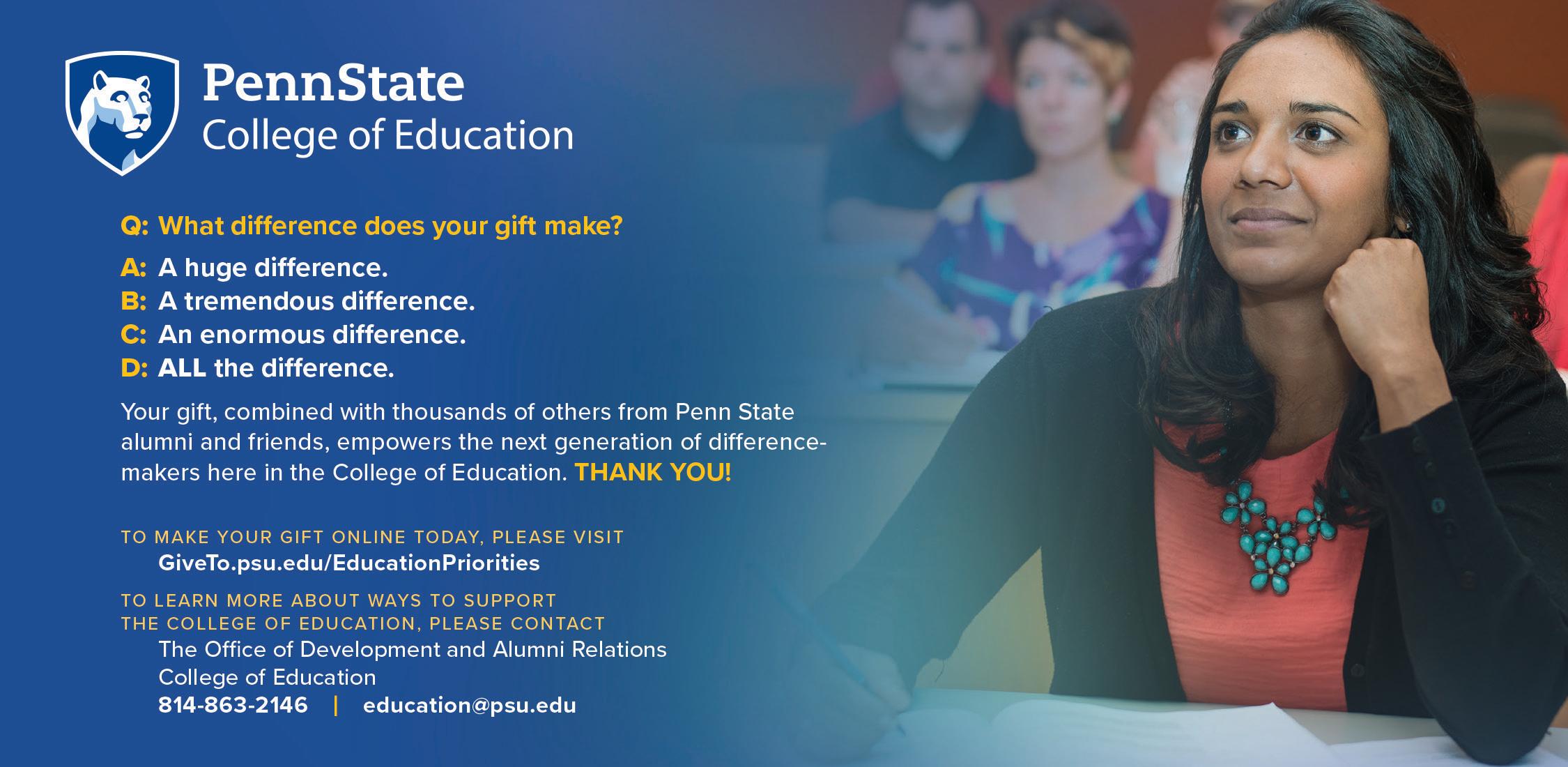
Nonprofit Org. US Postage PAID









































